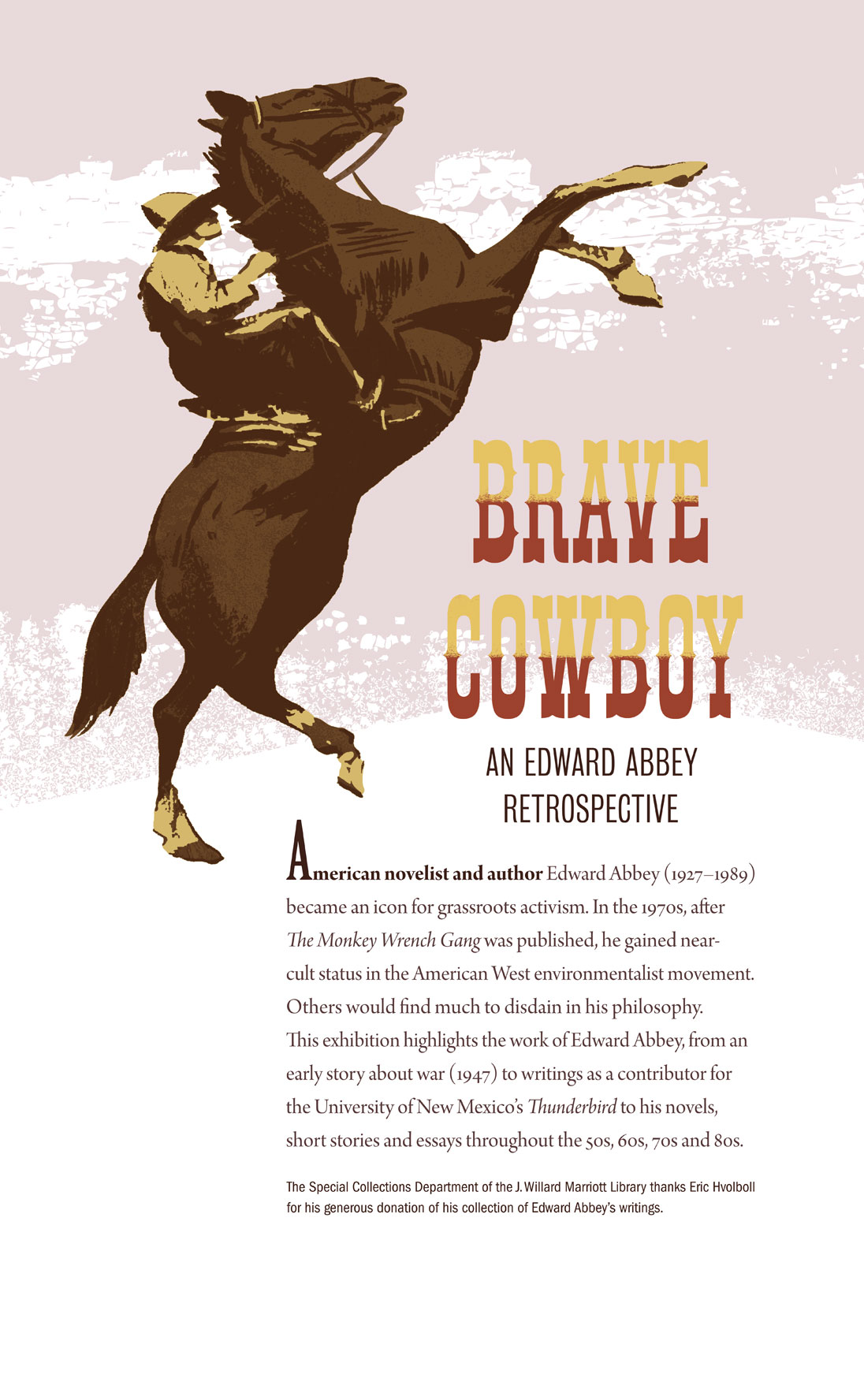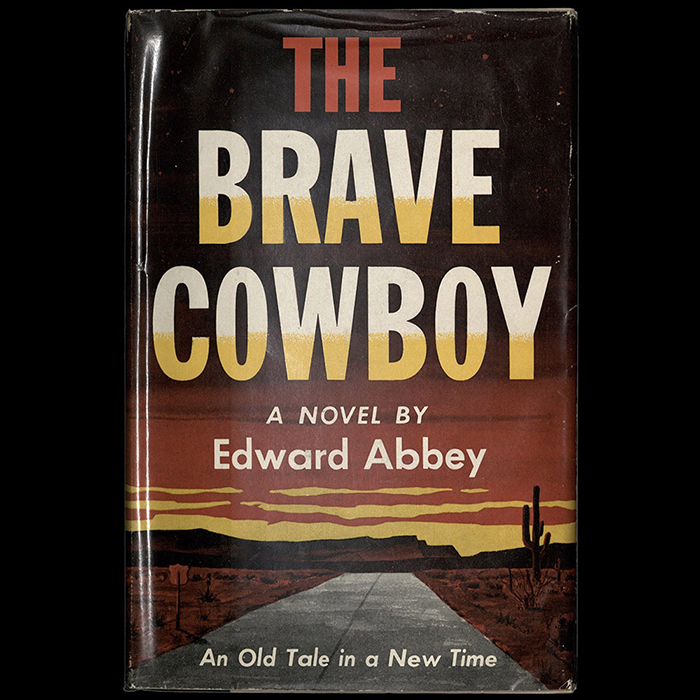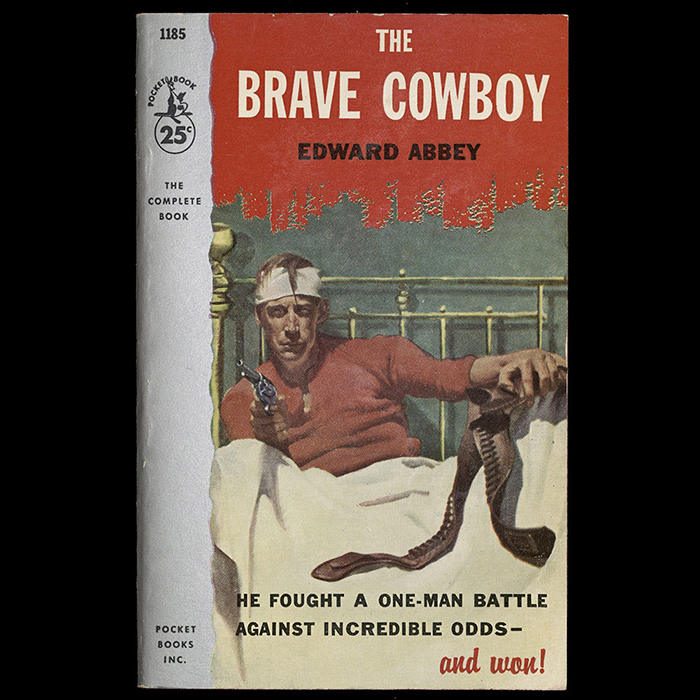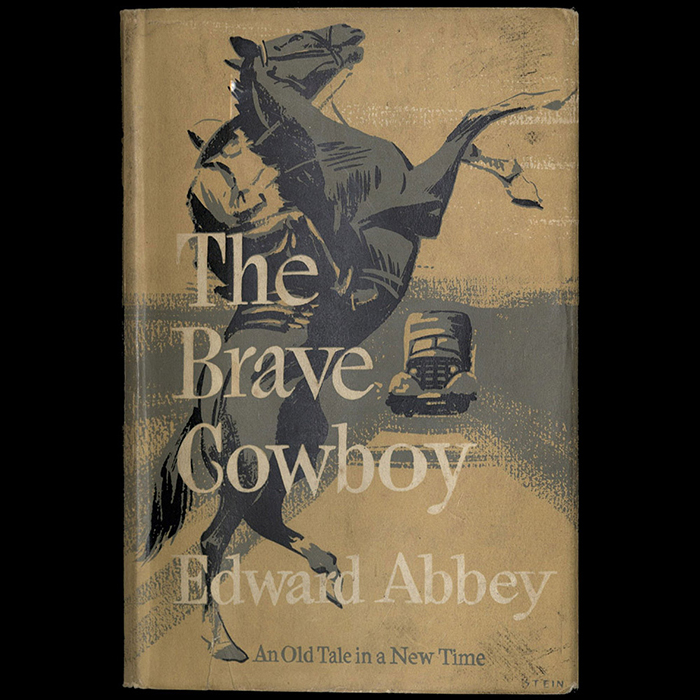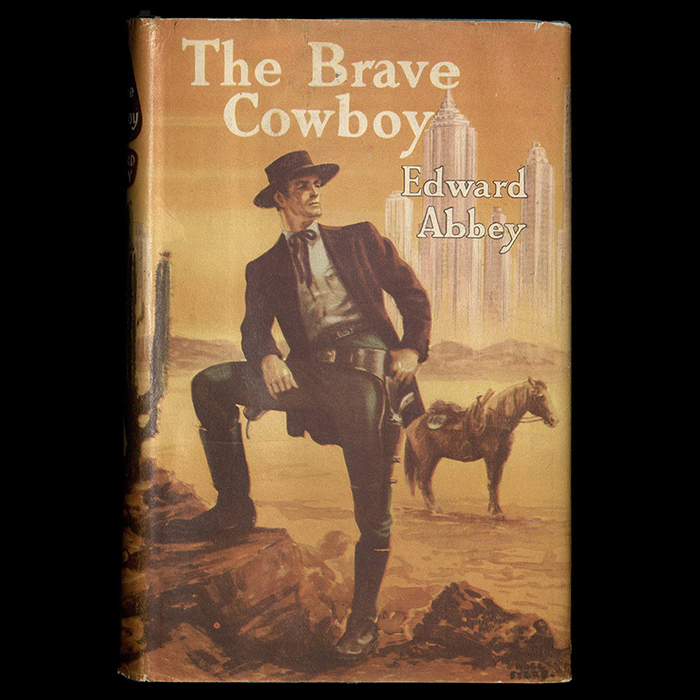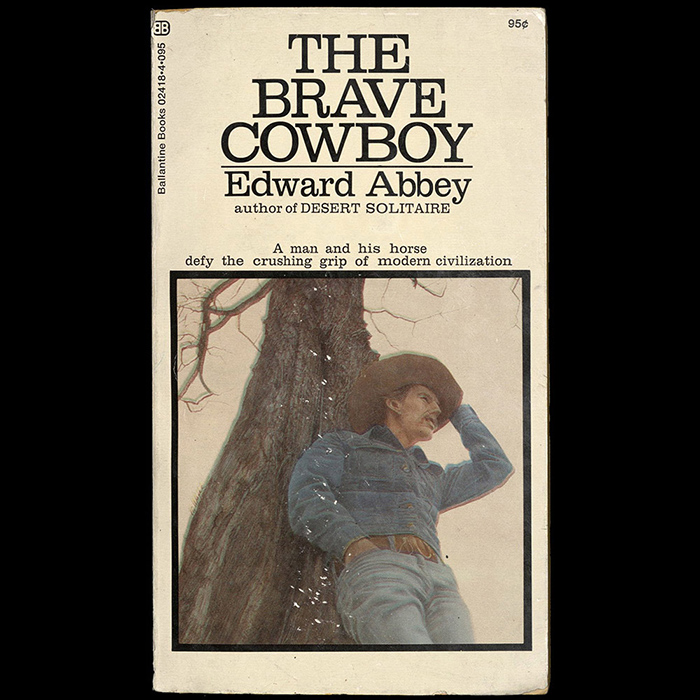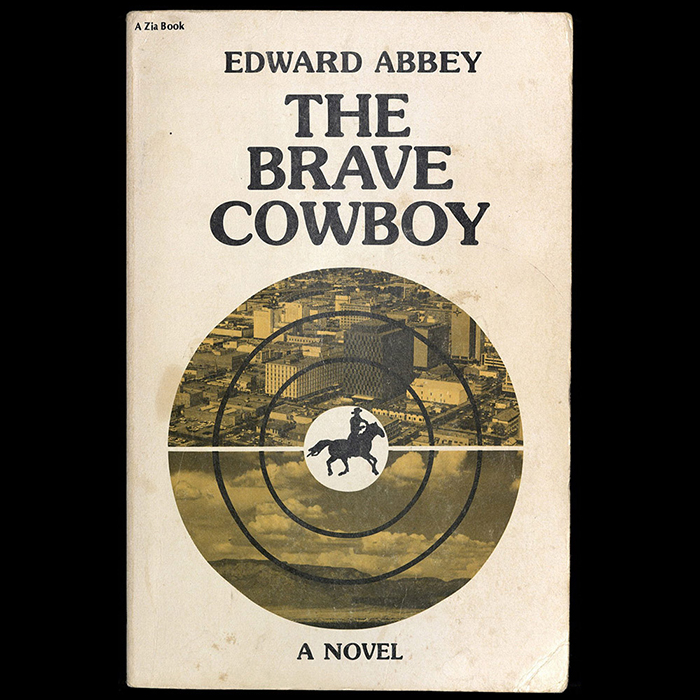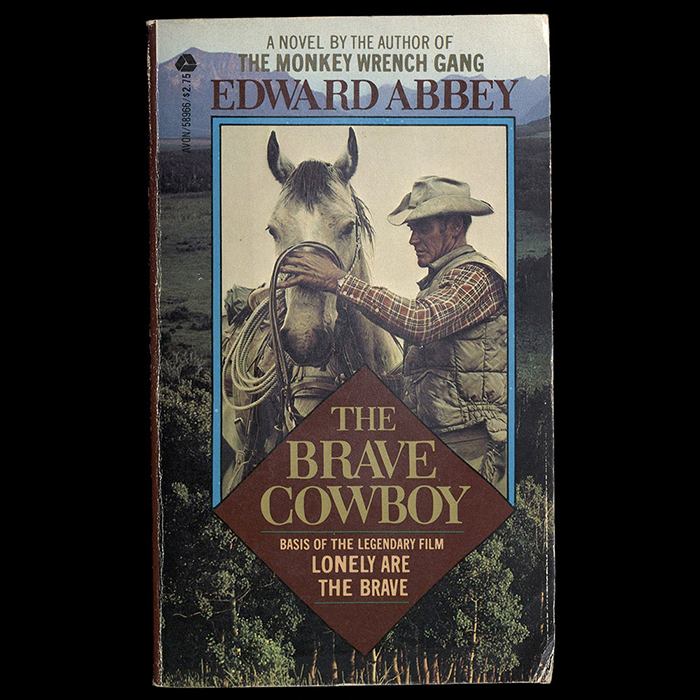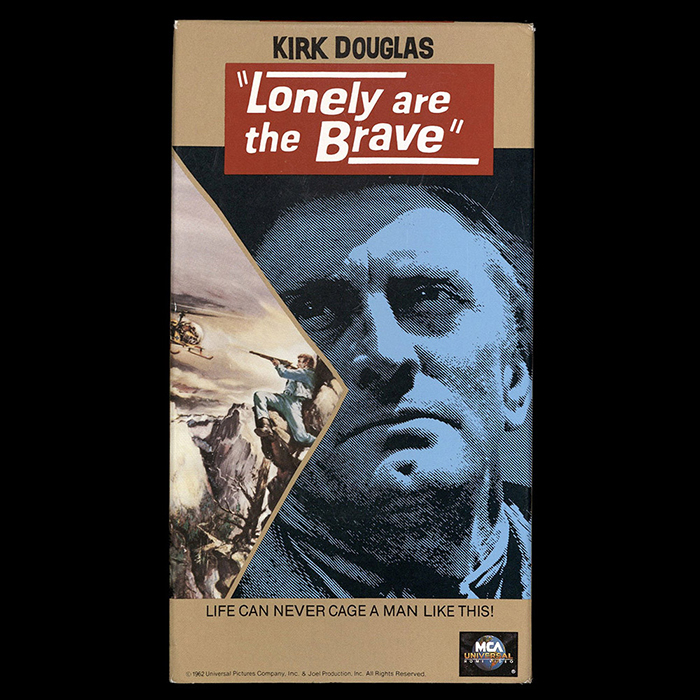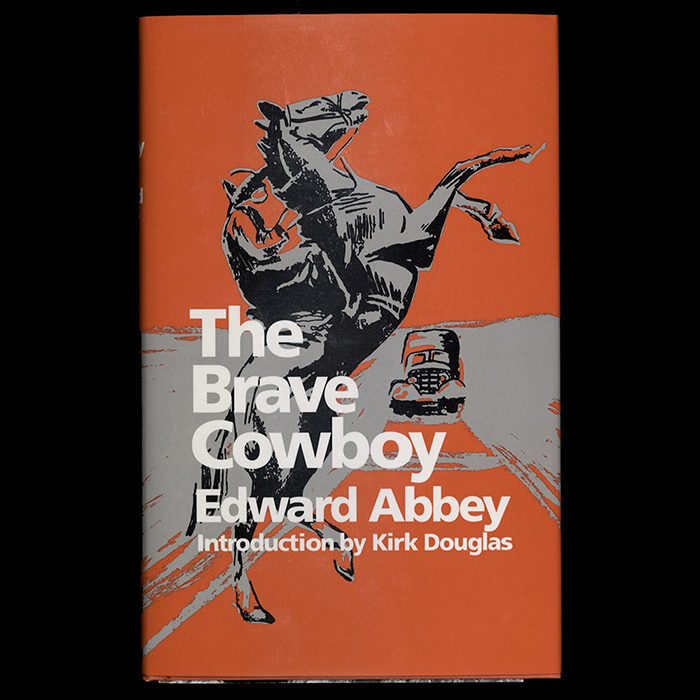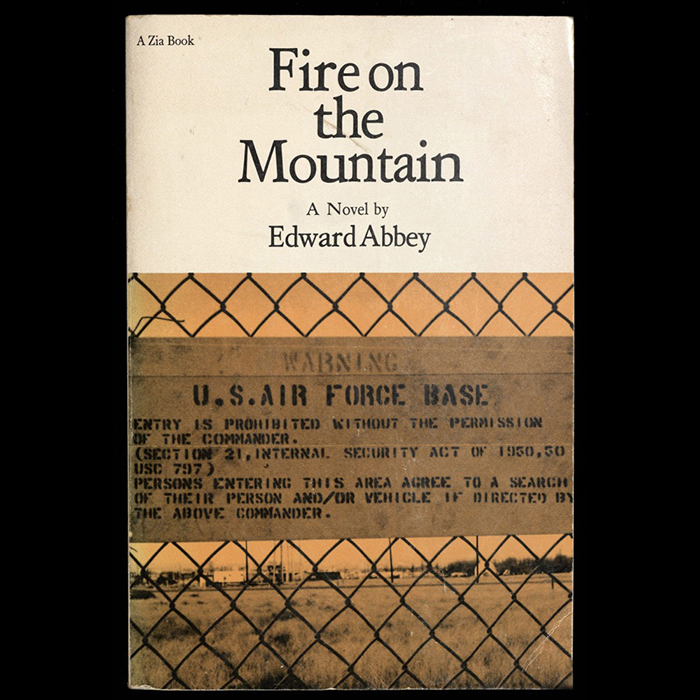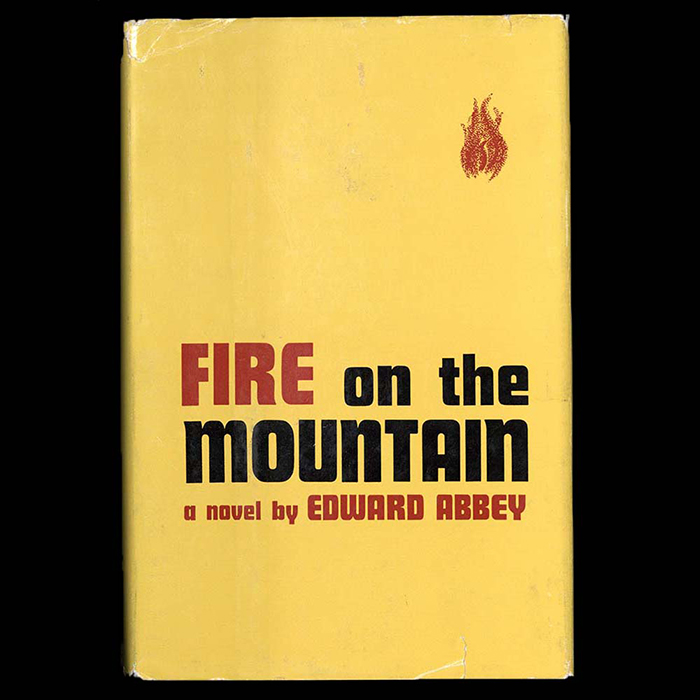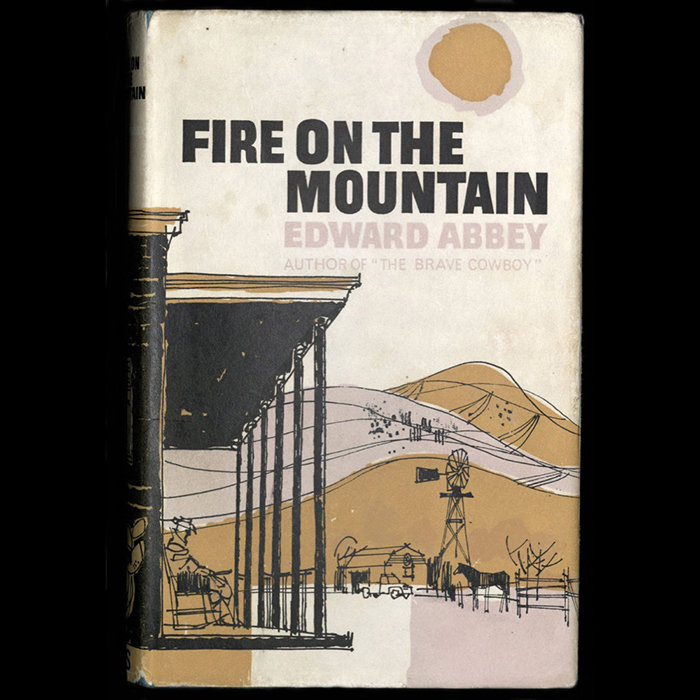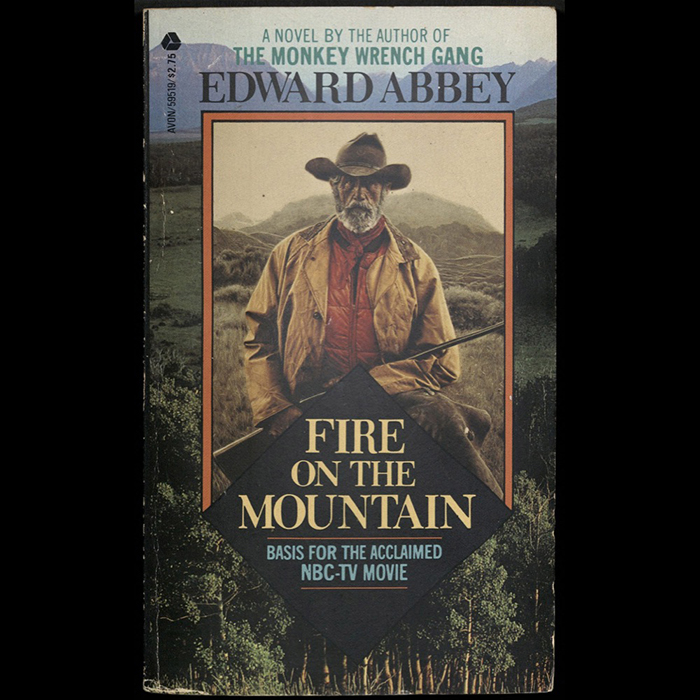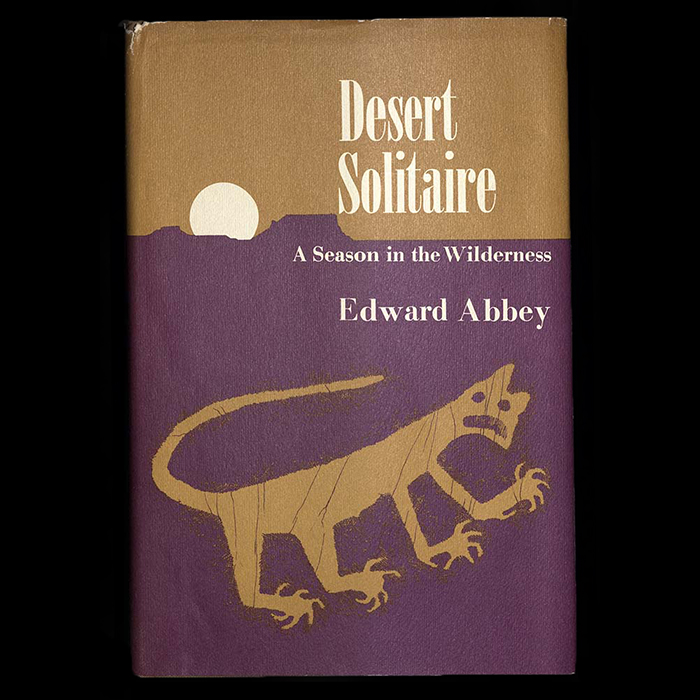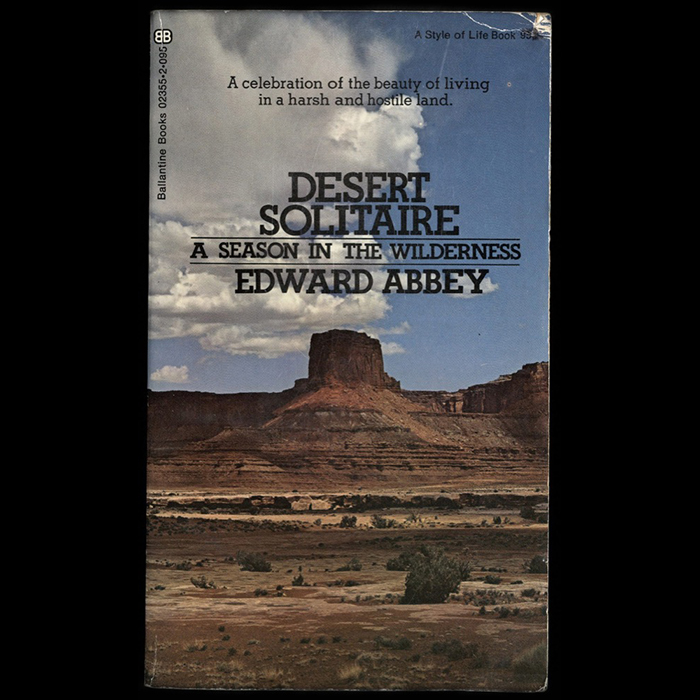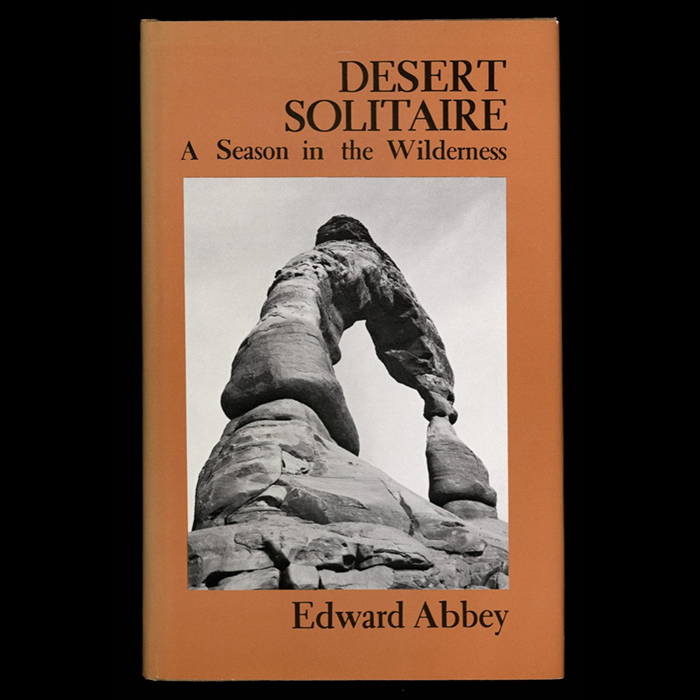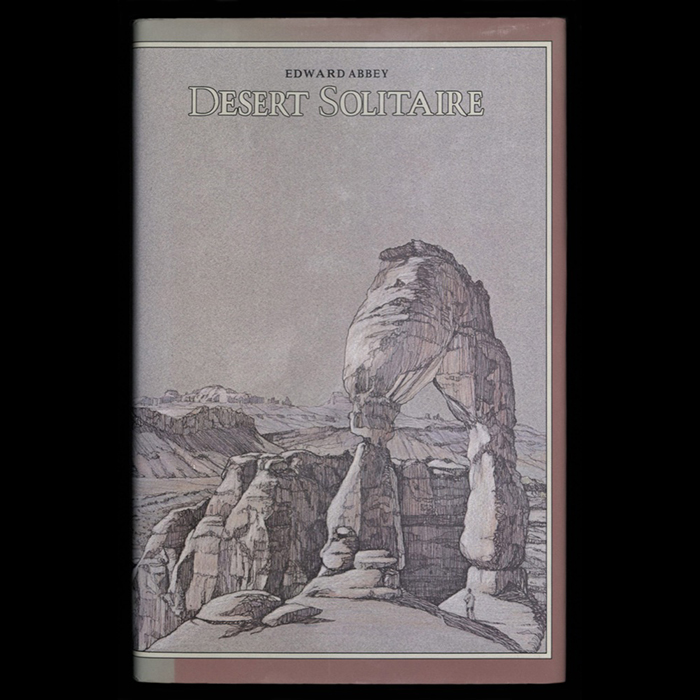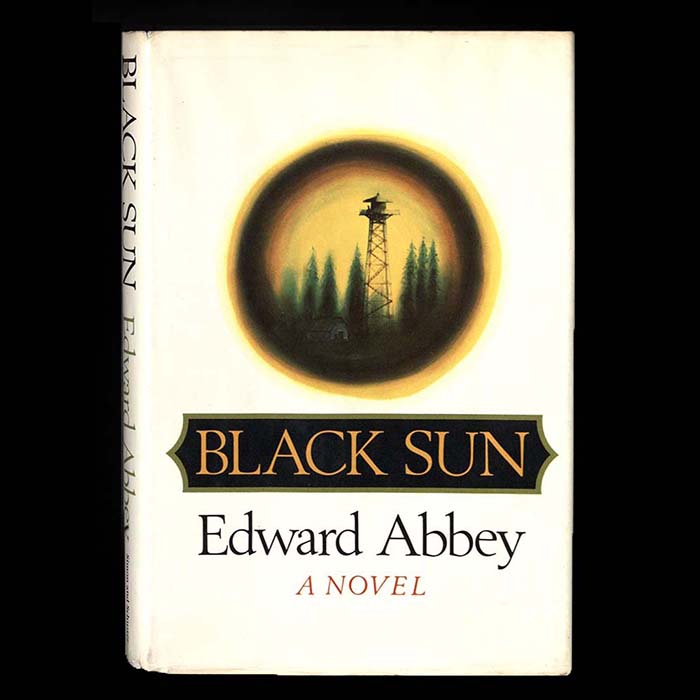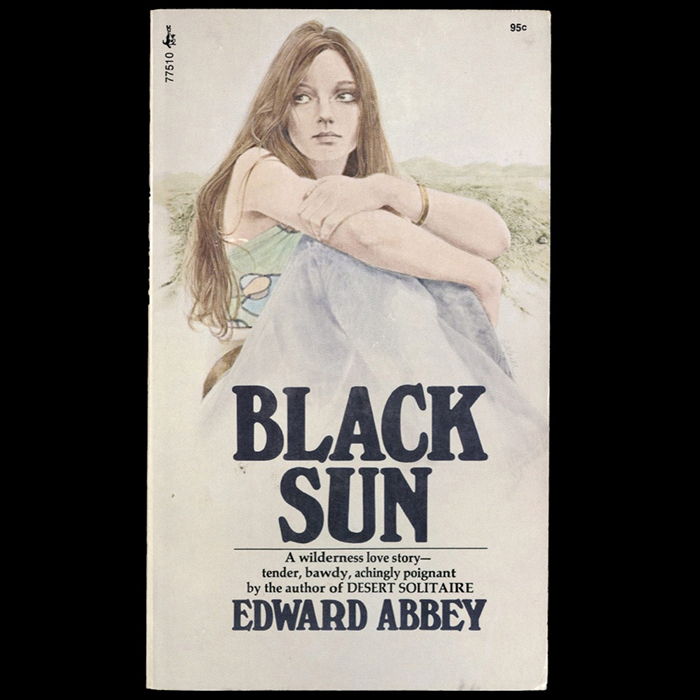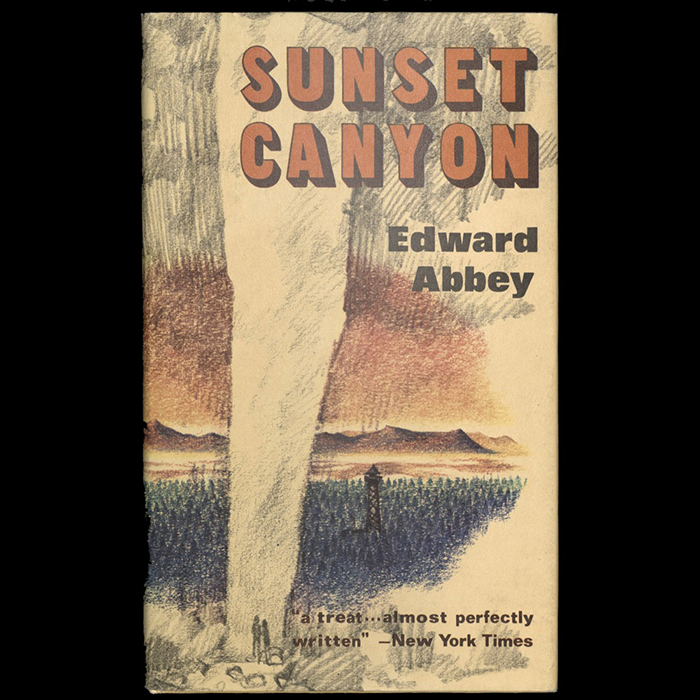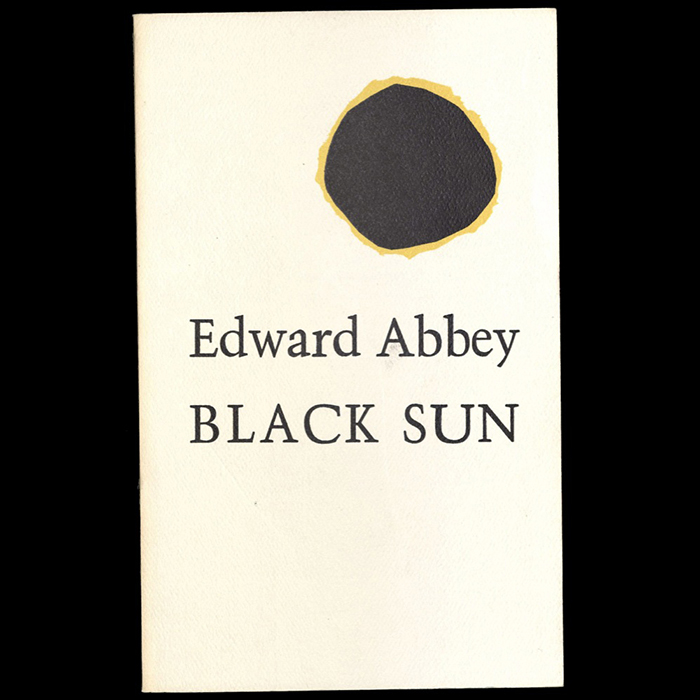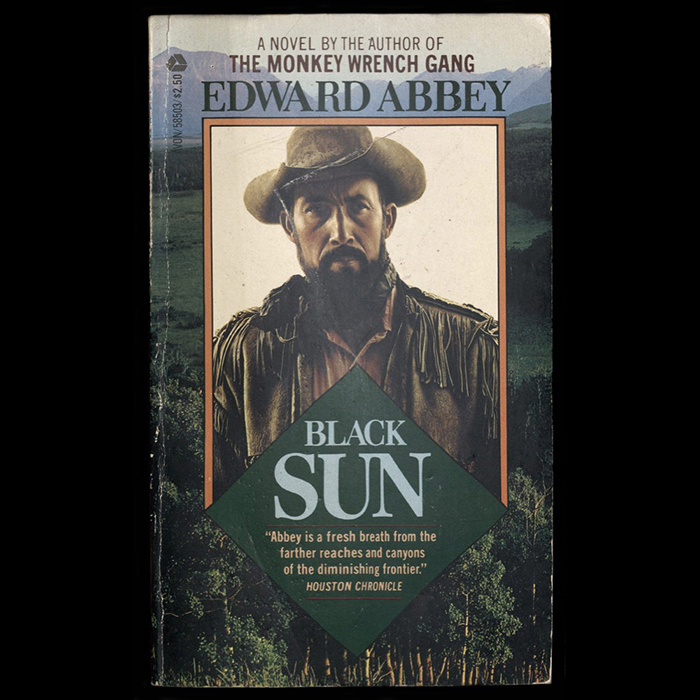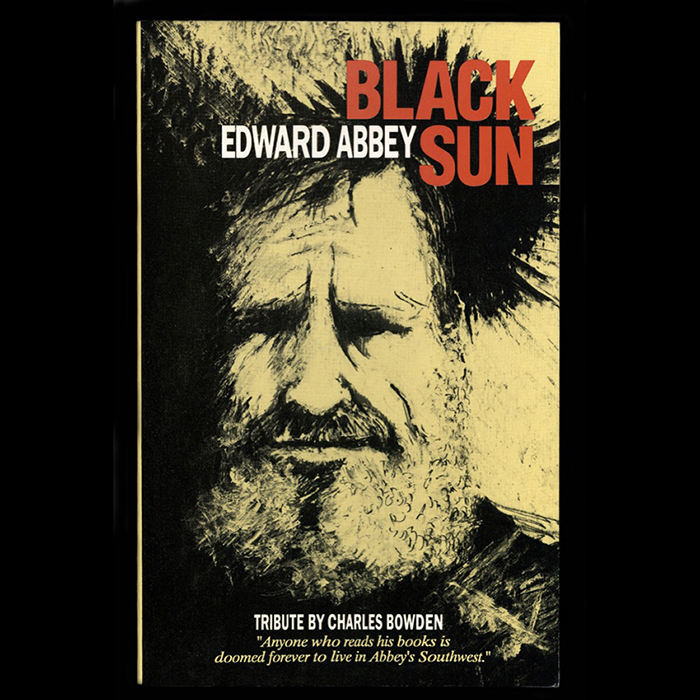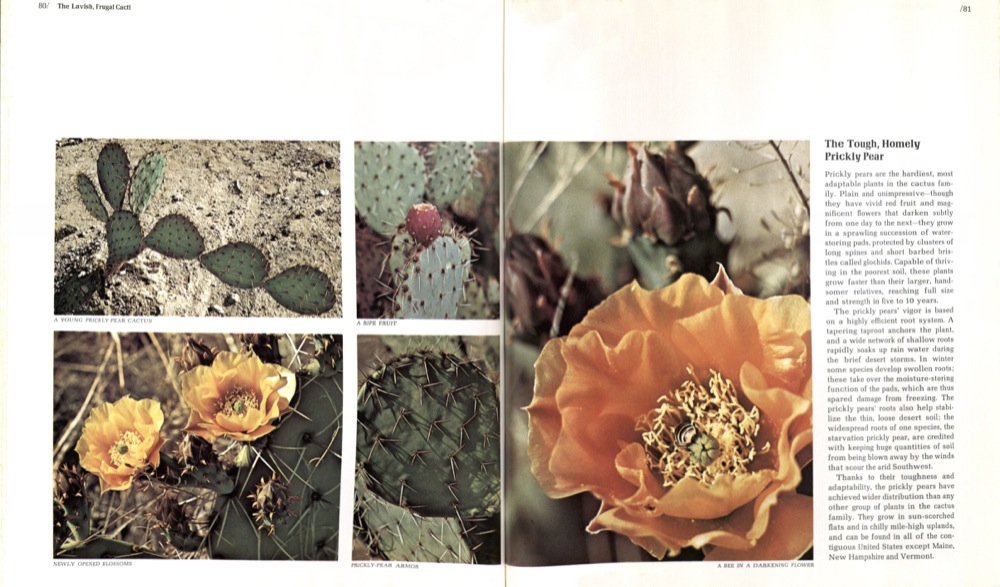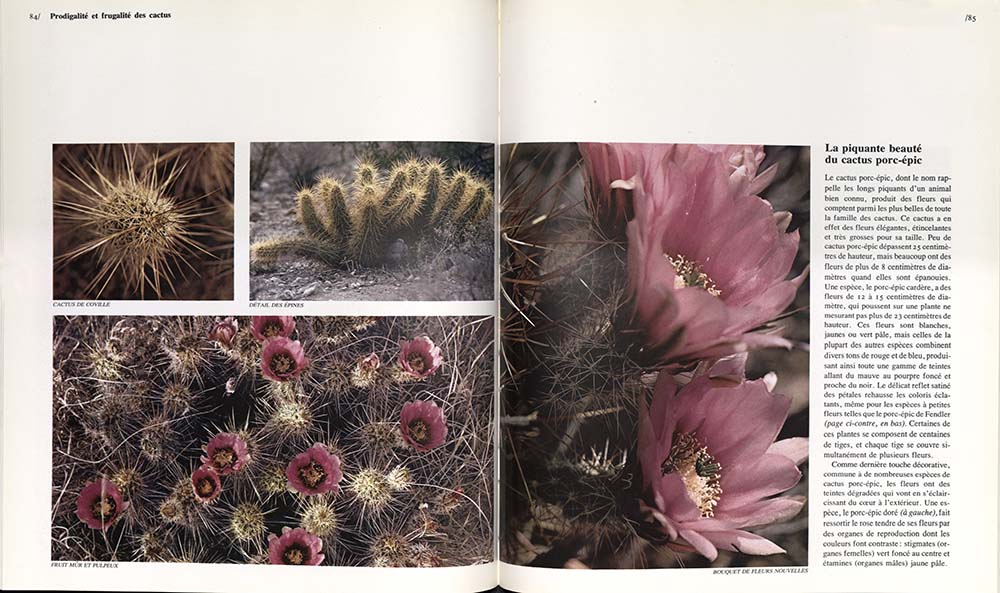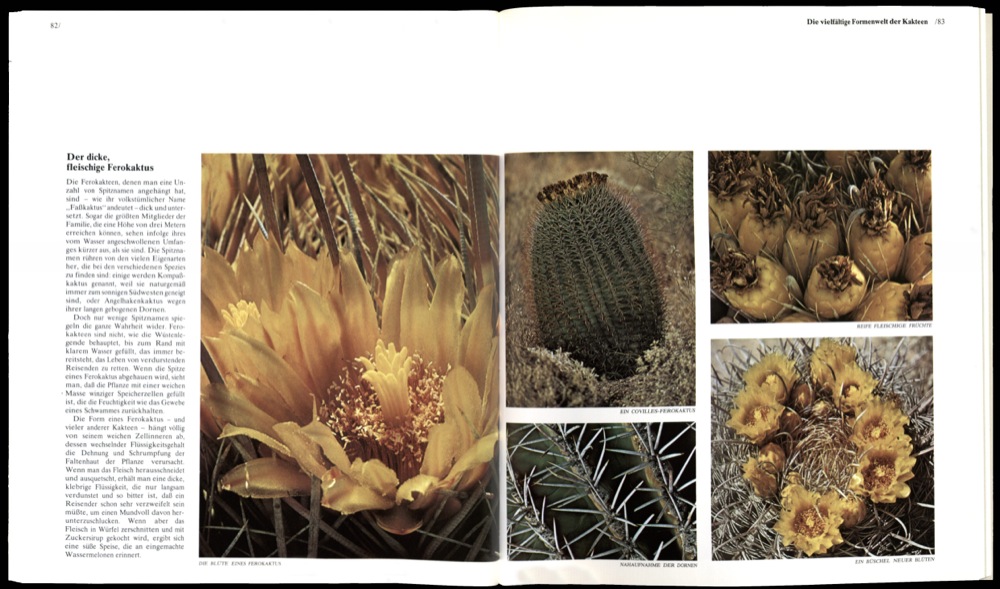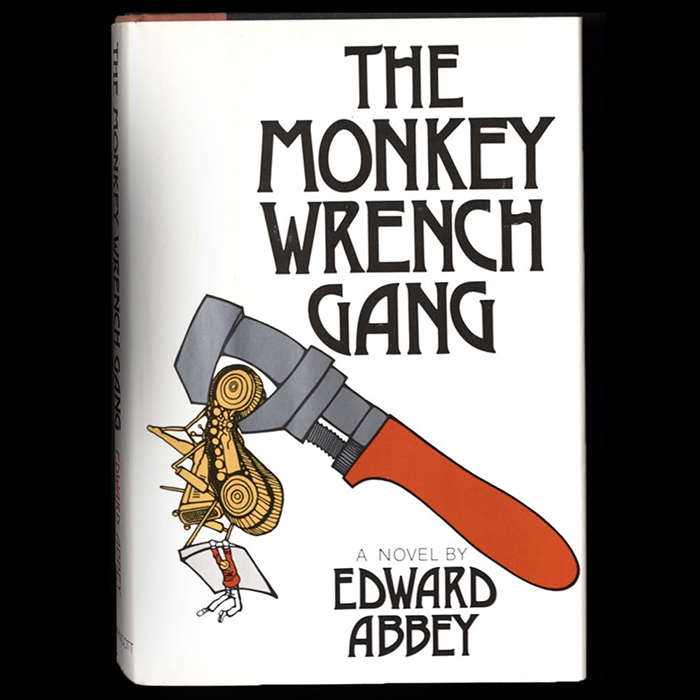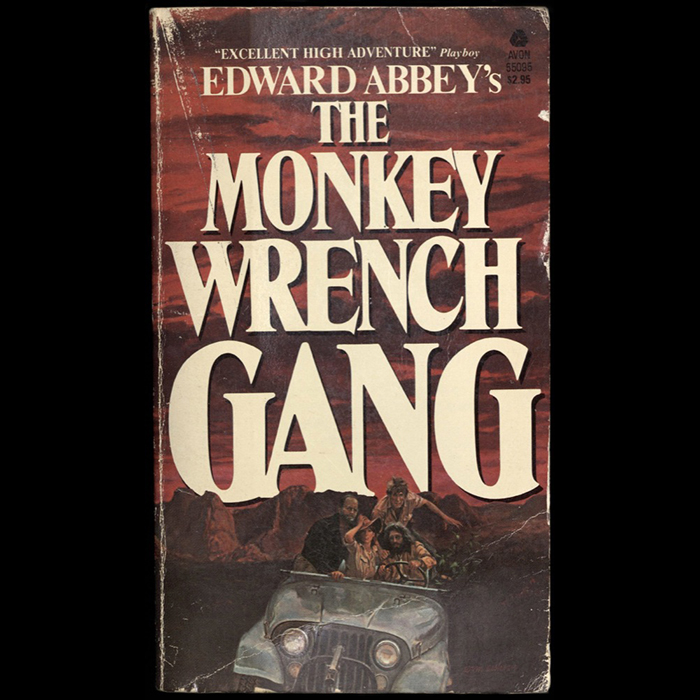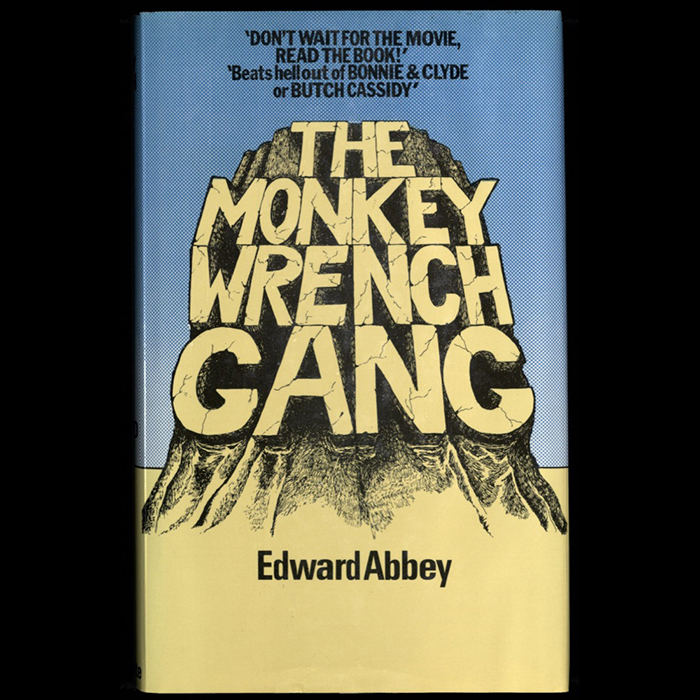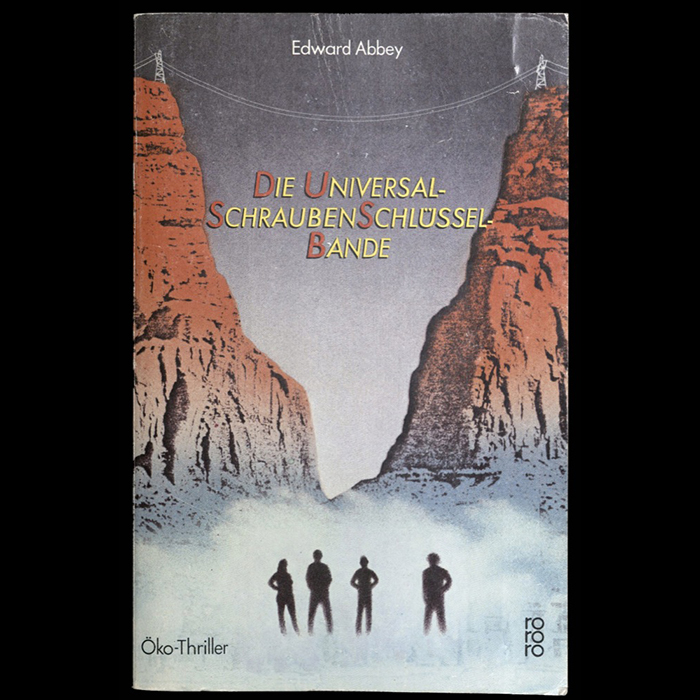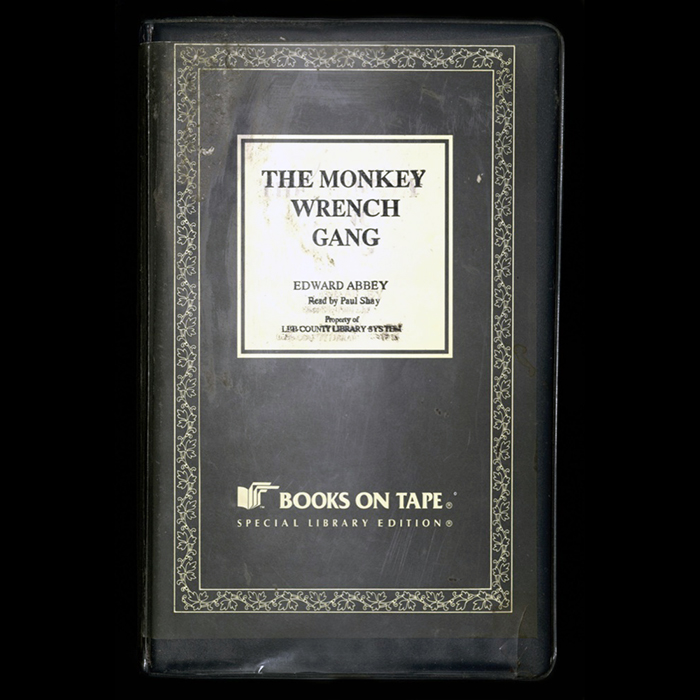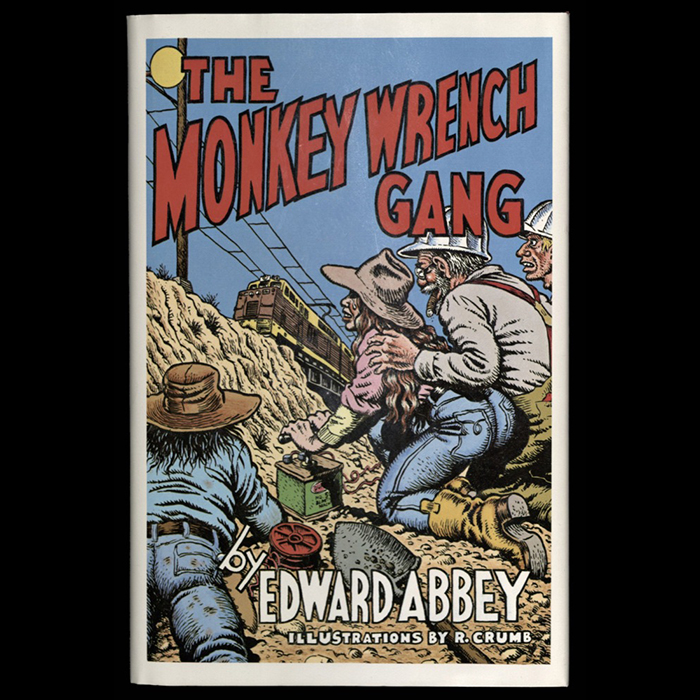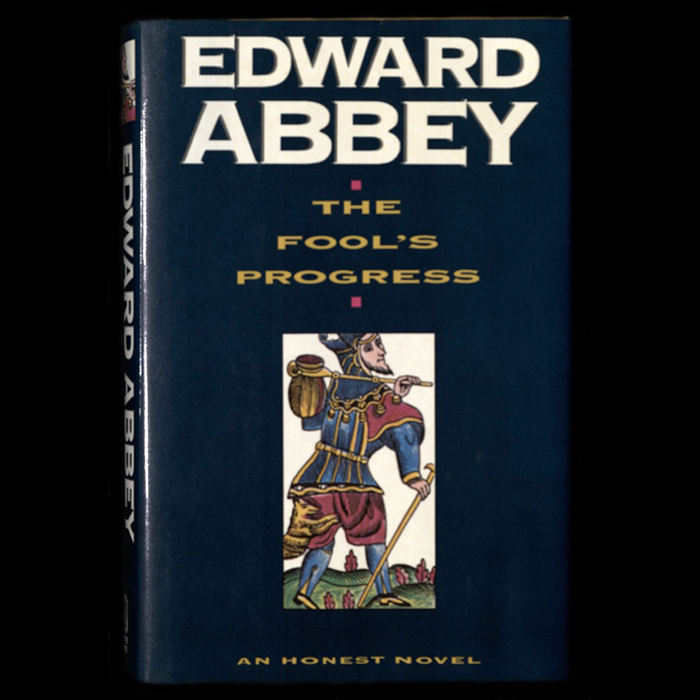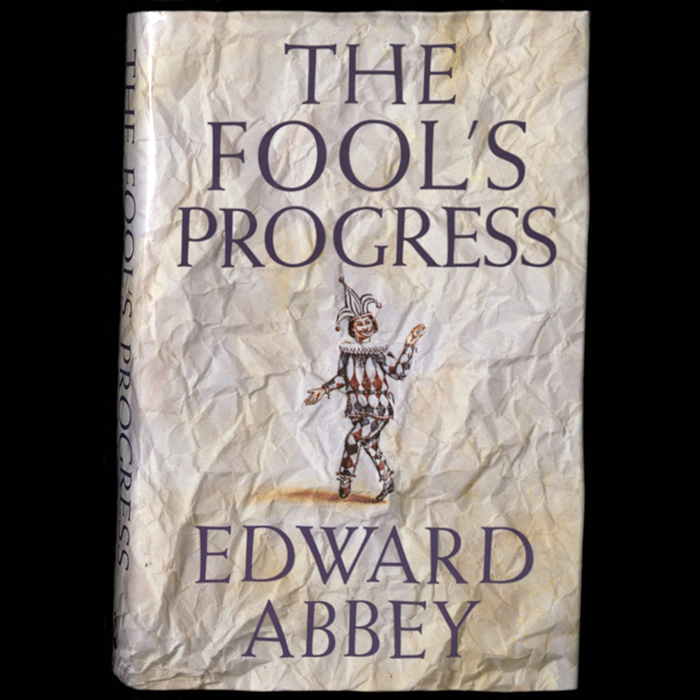Brave Cowboy
An Edward Abbey Retrospective
Checklist for "The Brave Cowboy"
Curated by Luise Poulton, 2012
Exhibition poster designed by David Wolske, 2012
Digital exhibition produced by Alison Elbrader, 2013
Format updated by Lyuba Basin, 2020
"The young man gripped the arms of his seat tightly and studied the distracting pair. He knew what they were – hypocrite socialites who came to concerts not to hear but to be seen. He contemplated their fat, capitalistic necks, their well-permanented hair, their expensive jewelry and gowns.”
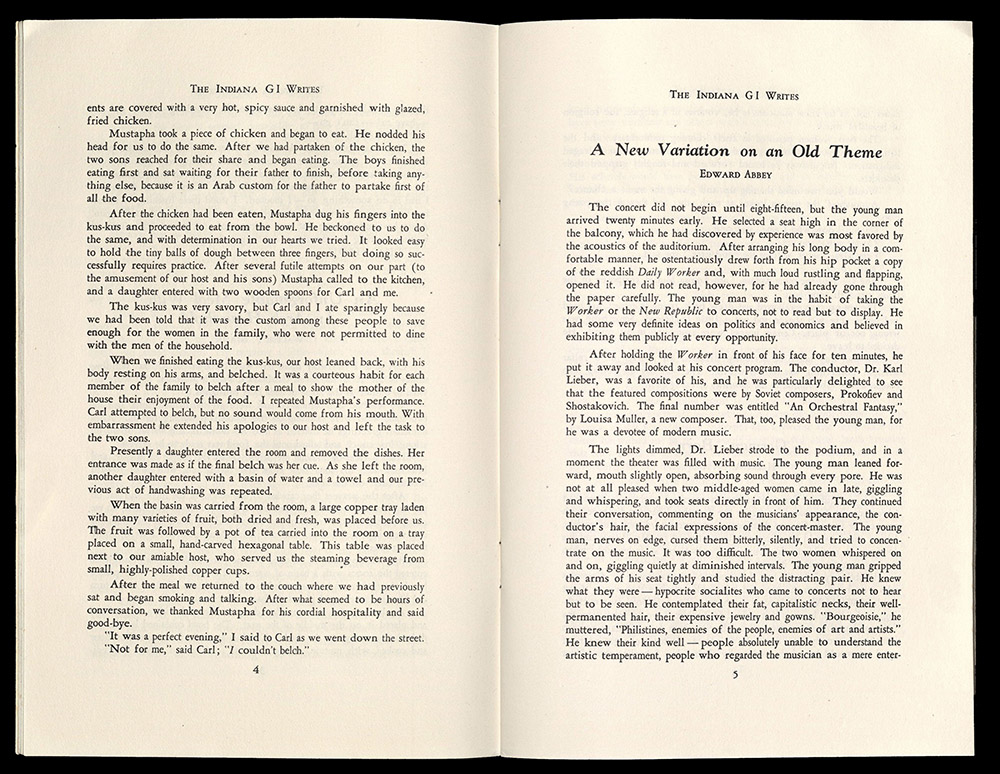
Indiana, PA: English Department, State Teachers College, 1947
PS571 I6 I57 1947
Included is the earliest published adult work of Edward Abbey, a short story entitled, “A New Variation on an Old Theme.”
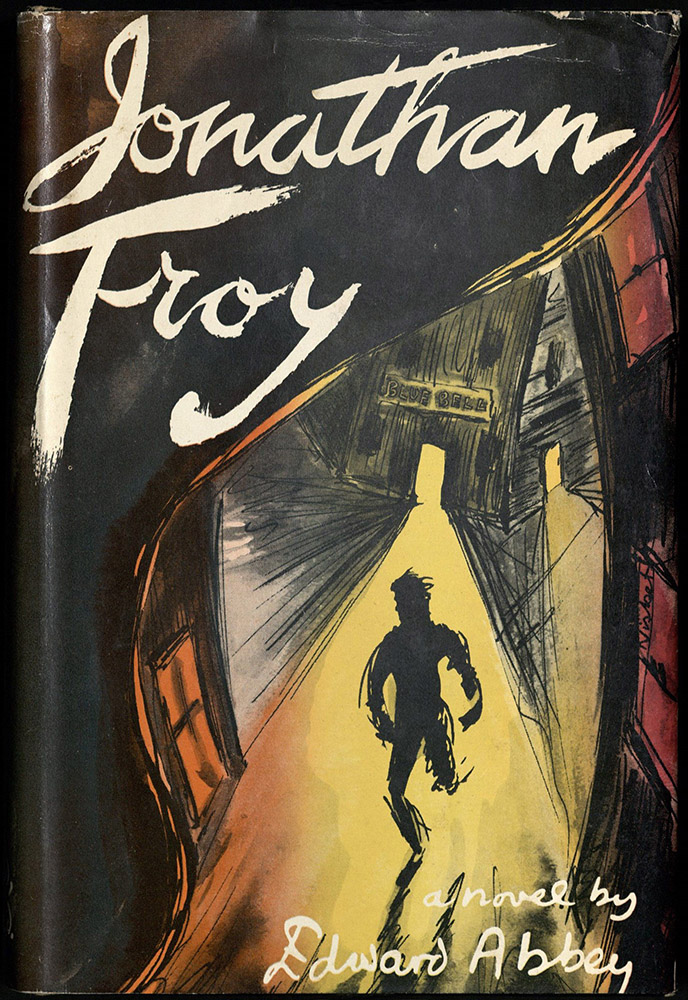
JONATHAN TROY
Edward Abbey (1927-1989)
New York: Dodd, Mead & Company, c1954
PS3551 B2 J6 1954
Edition of five thousand copies. Signed by Edward Abbey. Gift of Eric Hvolboll.
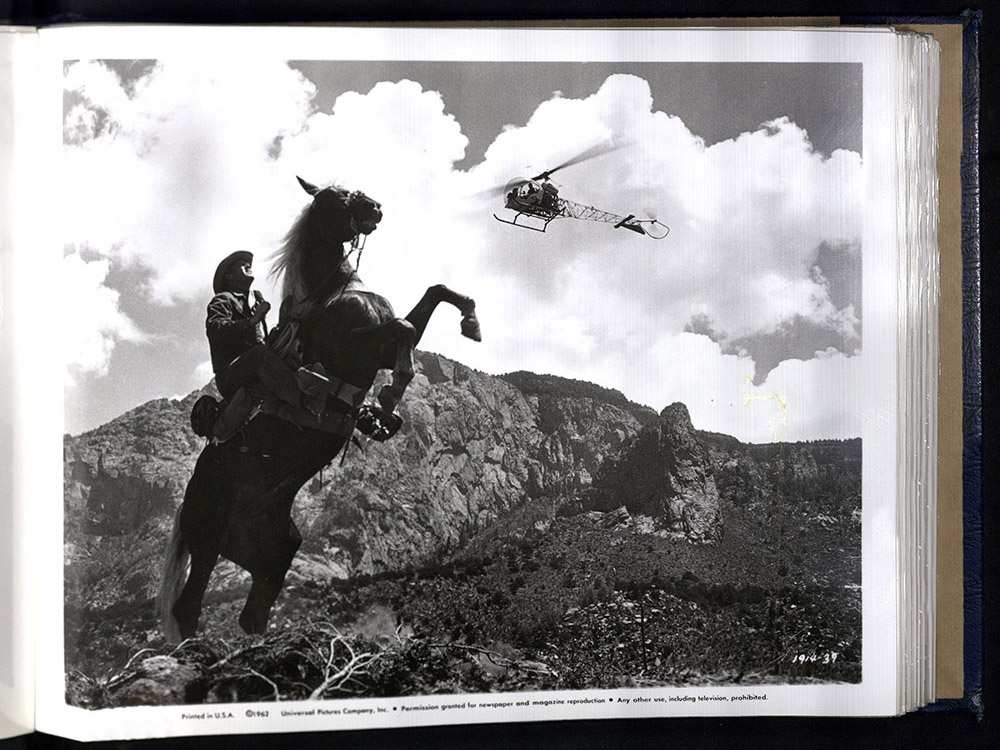
Edward Abbey (1927-1989)
Los Angeles, CA: Universal Pictures Company, Inc., c1962
PN1997 L66113 1962
Photographs from the 1962 motion picture, Lonely are the Brave, based on the novel, The Brave Cowboy. The moved starred Kirk Douglas, Gena Rowlands, Walter Matthau, Michael Kane, Carroll O’Connor, and William Schallert.
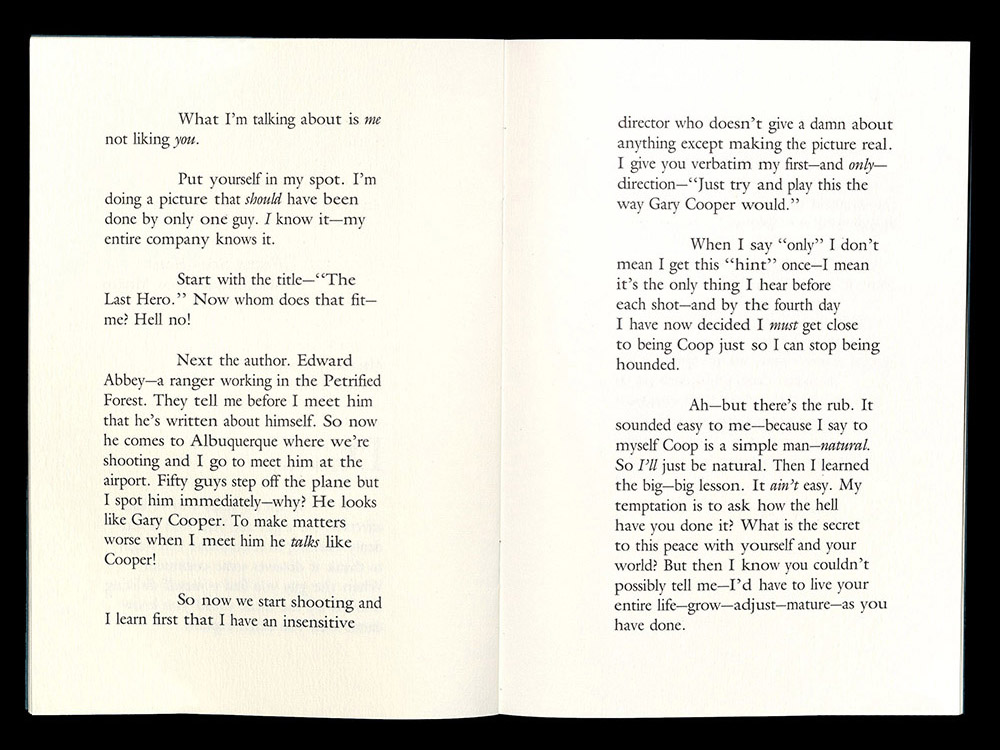
Kirk Douglas (b. 1916)
Santa Barbara: Santa Teresa Press, 1992
PN2287 D54 A4 1992
Letter written during the production of “Lonely Are the Brave,” with an afterword by Kirk Douglas written in 1992. This was distributed as a holiday greeting in 1992. Edition of five hundred copies. Gift of Eric Hvolboll.
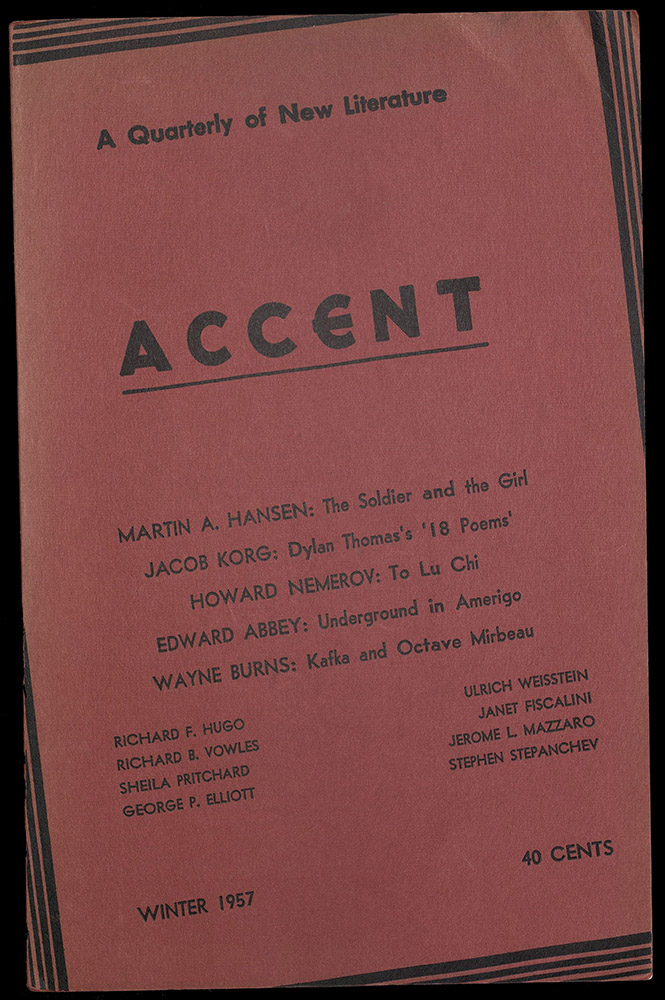
“UNDERGROUND IN AMERIGO”
Edward Abbey (1927-1989)
Urbana, IL: Dept. of English, University of Illinois, c1957
PS3551 B2 U6 1957
Short story by Edward Abbey which appeared in Accent: A Quarterly of New Literature, Winter 1957. Gift of Eric Hvolboll.
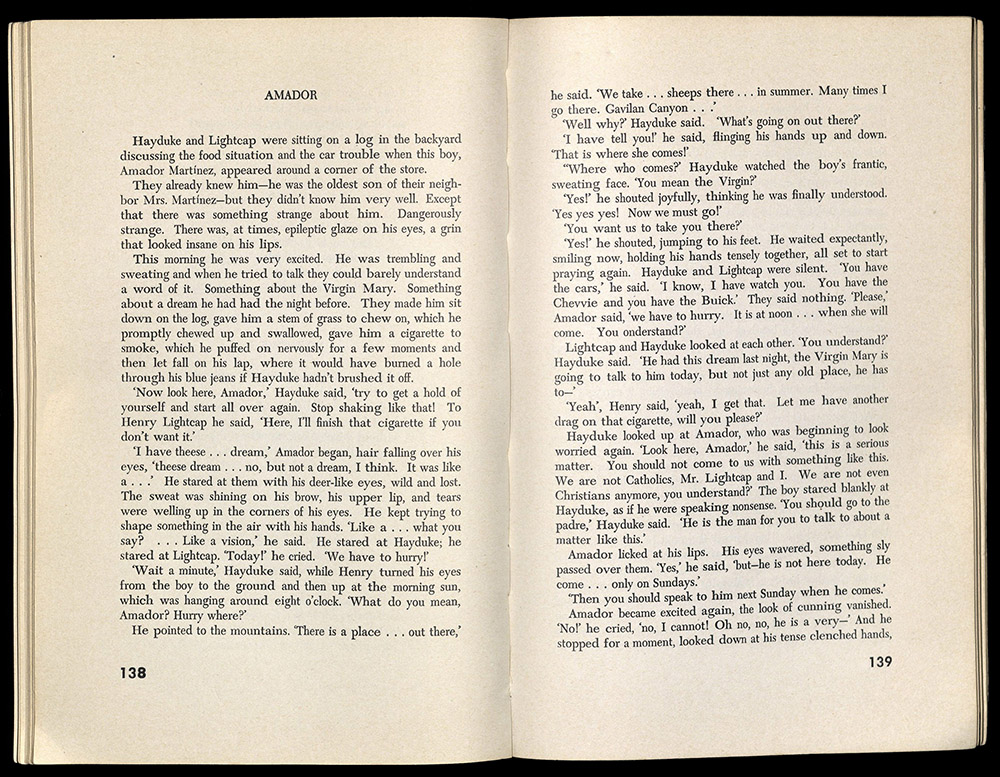
“AMADOR”
Edward Abbey (1927-1989)
Denver, CO: Inter American University, 1960
PS3551 B2 A73 1960
Short story by Edward Abbey which appeared in Between Worlds: An International Magazine of Creativity, vol. 1, no. 1, Summer 1960. Gift of Eric Hvolboll.
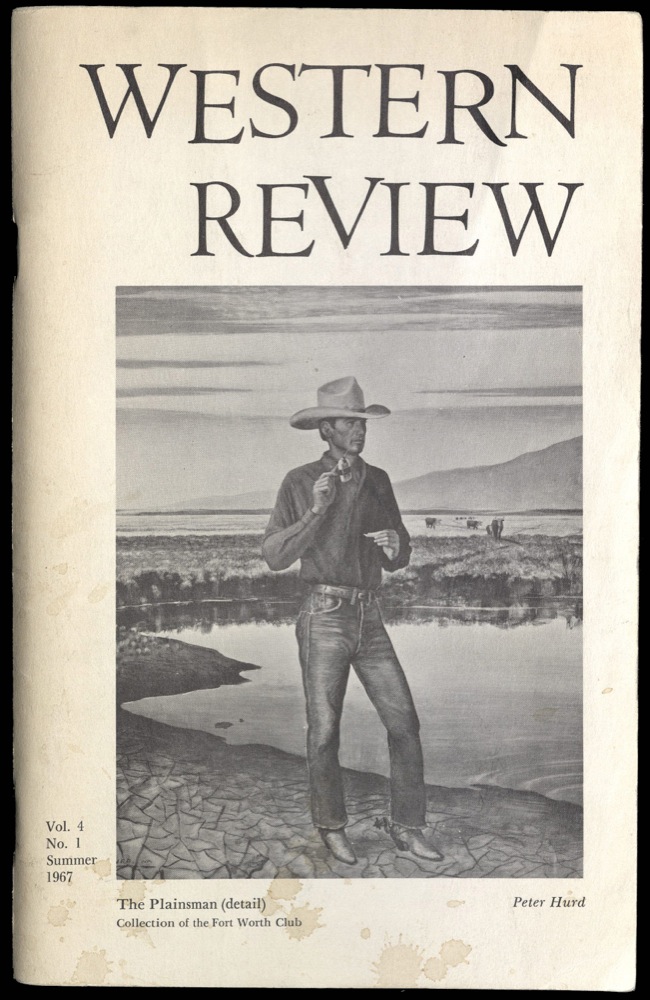
SUNFLOWERS
Edward Abbey (1927-1989)
Silver City, NM: Western New Mexico University, c1967
PS3551 B2 S8 1967
Excerpt from the manuscript of a novel in Western Review: A Journal of the Humanities, vol. 4, no. 1, Summer 1967. Gift of Eric Hvolboll.
“All kinds of ideas spring to mind, but an instinctive prudence makes me hold my tongue. What right have I to interfere with an old man’s antideath wish? He knows what he’s doing; let him savor it to the full. He’ll never have another chance as good as this. Each man in his humor. Every cobbler gets clobbered at last, etc. Let him shamble through the dark at night in his underwear, looking for the black skunk with the white stripe down its back, the ultimate enemy.”
“The canyon curves deeply to the left and right, sinuous as a snake, no more willing to follow a straight line than anything else in nature.”
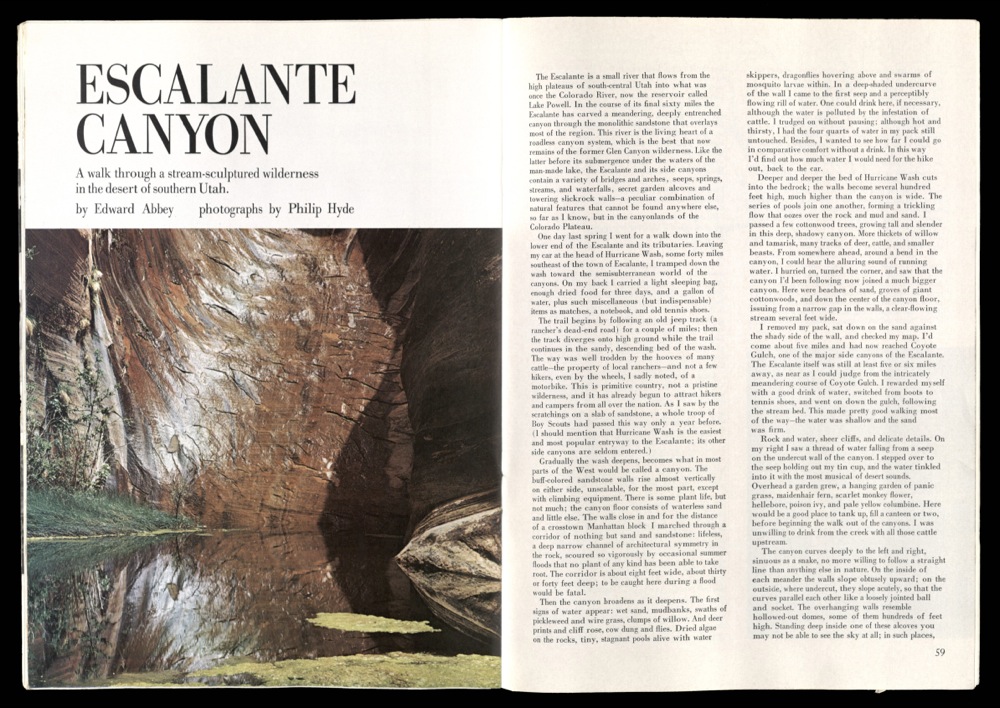
ESCALANTE CANYON: A WALK THROUGH A STREAM-SCULPTURED WILDERNESS...
Edward Abbey (1927-1989)
New York, NY: American Museum of Natural History, c1969
F832 E83 A23 1969
Photographs by Philip Hyde. Article from Natural History, vol. 78, no. 9, November 1969. Gift of Eric Hvolboll.
“While the earth lay still in a soft and plastic state, a great buzzard, grandfather of all buzzards, was sent down from heaven to dry the soft earth mud with the beating of his wings…this buzzard became very tired, sinking so close to the surface that his wings struck the soft earth and formed the ridges, mountains and valleys that later became known as Appalachia.”
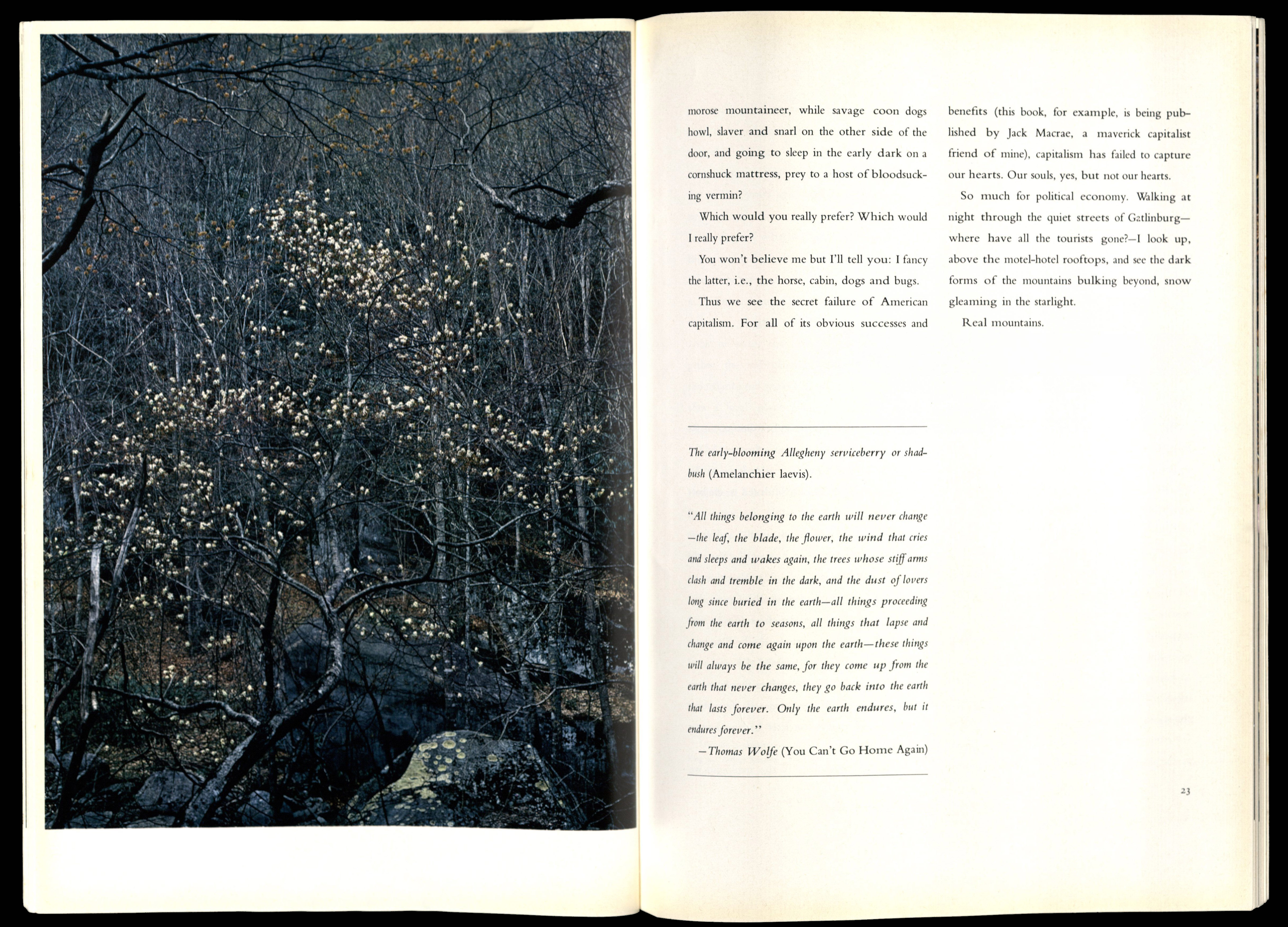
APPALACHIAN WILDERNESS: THE GREAT SMOKEY MOUNTAINS
Eliot Porter (1901-1990)
New York: Dutton, 1970
First edition
F106 P86 1970
Essay by Edward Abbey. Signed by Edward Abbey. Gift of Eric Hvolboll.
“They walk down the darkening pathway. The deer watch, their mule ears alert; in silhouette they look like giant hares. Down the trail, under the breathing and whispering trees, through a grove of crooked aspen in a green-gold fading light. The hermit thrush. Two men walking beneath the glowing and heart-breaking sky, where mountainous clouds drift against the wheeling spokes of evening, toward the even star. One talking.”
“What would it be like to live in this place? Could a man ever grow weary of such a home? Someday…I shall make the experiment, become an ancient baldheaded troglodyte with a dirty white beard tucked in my belt, be a shaman, a wizard, a witch doctor crazy with solitude, starving on locusts and lizards, feasting from time to time upon lost straggler boy scout. Madness: of course a man would go mad from the beauty and the loneliness, both equally mysterious. But perhaps it would be – who can say? – a kind of blessed insanity, like the bliss of a snake in the winter sun...”
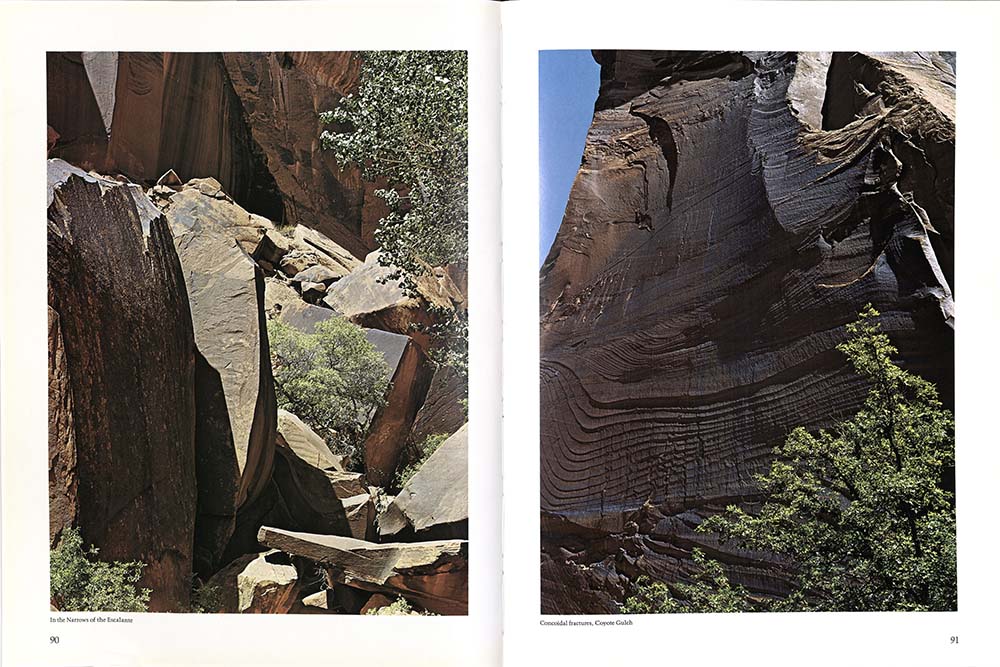
SLICKROCK: THE CANYON COUNTRY OF SOUTHEAST UTAH
Edward Abbey (1927-1989)
San Francisco, CA: Sierra Club, 1971
F830 A62 1971
Photographs and commentary by Philip Hyde. Gift of Eric Hvolboll.
“[The conservationists] believe that the web of life… is so fine, intricate, specialized, and diversified that harm to any part will do harm to the whole.”
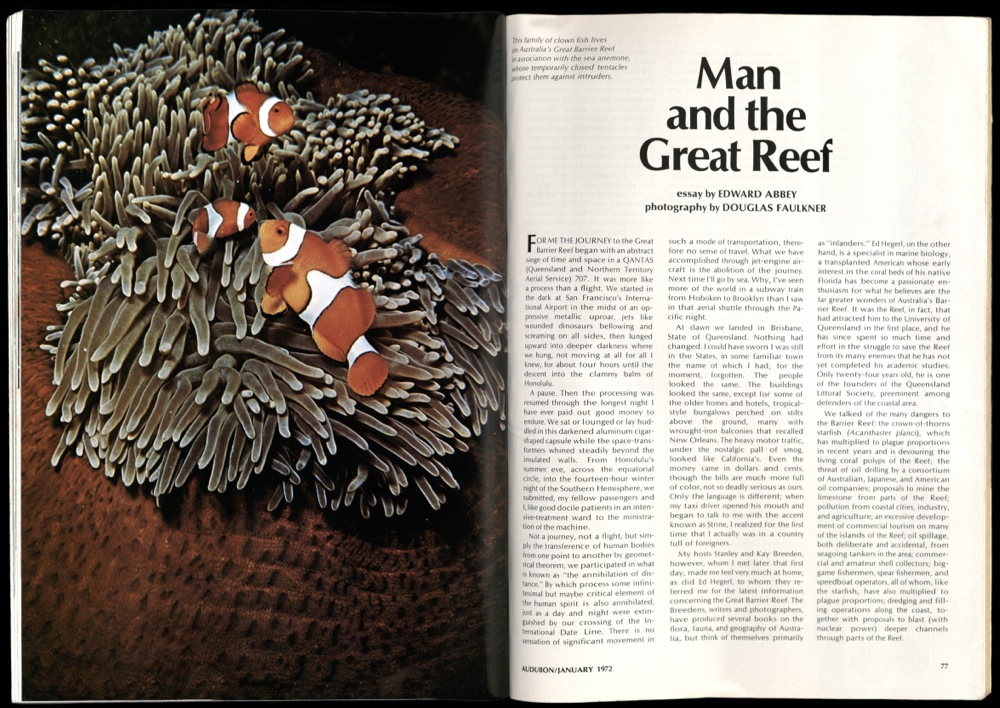
MAN AND THE GREAT REEF
Edward Abbey (1927-1989)
New York, NY: National Audubon Society, c1972
QH197 A23 1972
Article from Audubon, vol. 74, no. 1, January 1972. Gift of Eric Hvolboll.
“Death and life usually appear close together, sometimes side by side, in the desert. Perhaps that is the secret of the desert’s fascination: all looks naked, out in the open in this all too vulnerable land. Wherever we look we are reminded of death – by the glimmering wastes of alkali flats; by the burned-out volcanic hills;…by the occasional little white crosses along the roadways, marking the sites of fatal accidents on the heat-shimmering straightaways; by the remains of a maggot-swarming, dehydrated cow; by the hulk of a rotting saguaro, whose sloughing skin seems to present decay and decomposition in its most vivid form: nothing, not even the waiting vulture in the sky, looks more deathly than a dying giant cactus.”
CACTUS COUNTRY
Edward Abbey (1927-1989)
New York: Time-Life Books, 1973
QH88 A2 1973
Signed by Edward Abbey. Gift of Eric Hvolboll.
“The heron in the canyon, a bighorn ram on the cliff above, one lean coyote on the rim across the river hear the sound of a howl, the song of a wolf, rise in the twilight stillness and spread through the emptiness of the desert evening. One long and prolonged, deep and dangerous, wild archaic howl, rising and rising and rising on the quiet air.”
THE MONKEY WRENCH GANG
Edward Abbey (1927-1989)
Philadelphia: Lippincott, 1975
First edition
PS3551 B2 M6 1975
Signed by Edward Abbey. Gift of Eric Hvolboll.
“You cannot touch the Earth while strapped inside a machine. You cannot feel your home through wheels or see and taste it through a pane of glass.”
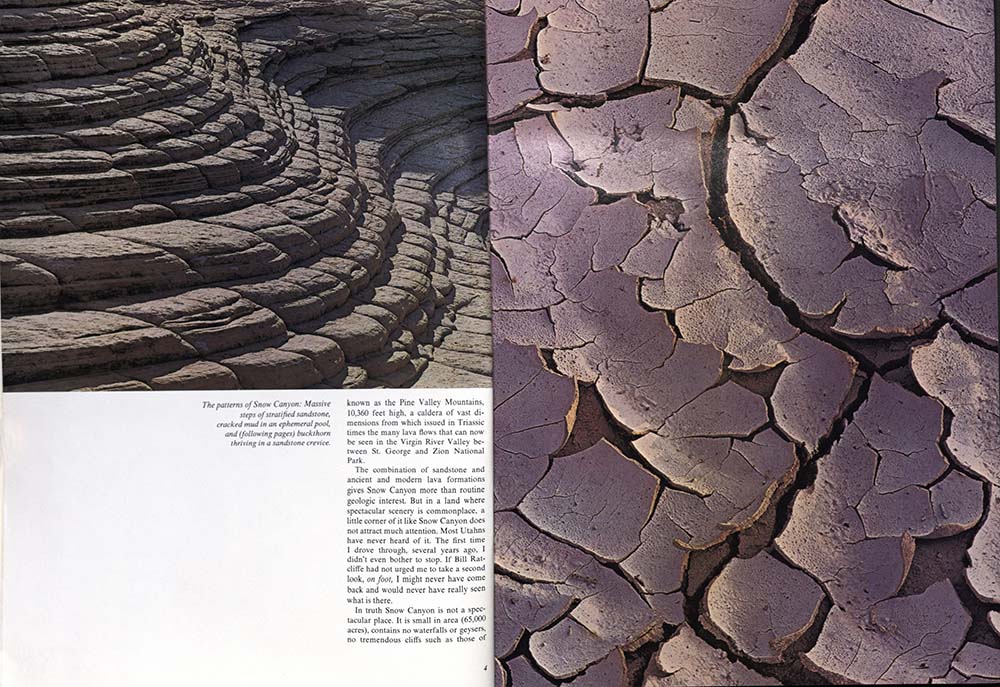
SNOW CANYON
Edward Abbey (1927-1989)
New York, NY: National Audubon Society, c1975
F832 W24 A23 1975
Article from Audubon, vol. 77, no. 4, July 1975. Gift of Eric Hvolboll.
“Only we dumb locals may suffer physically from the power plants; but all Americans who enjoy – actually or potentially – the Grand Canyon, Lake Powell, Monument Valley, Shiprock, Canyon de Chelly, Zion, Bryce Canyon, Capitol Reef, Arches and Canyonlands national parks will be forced to accept the drastic degradation of the national heritage.”
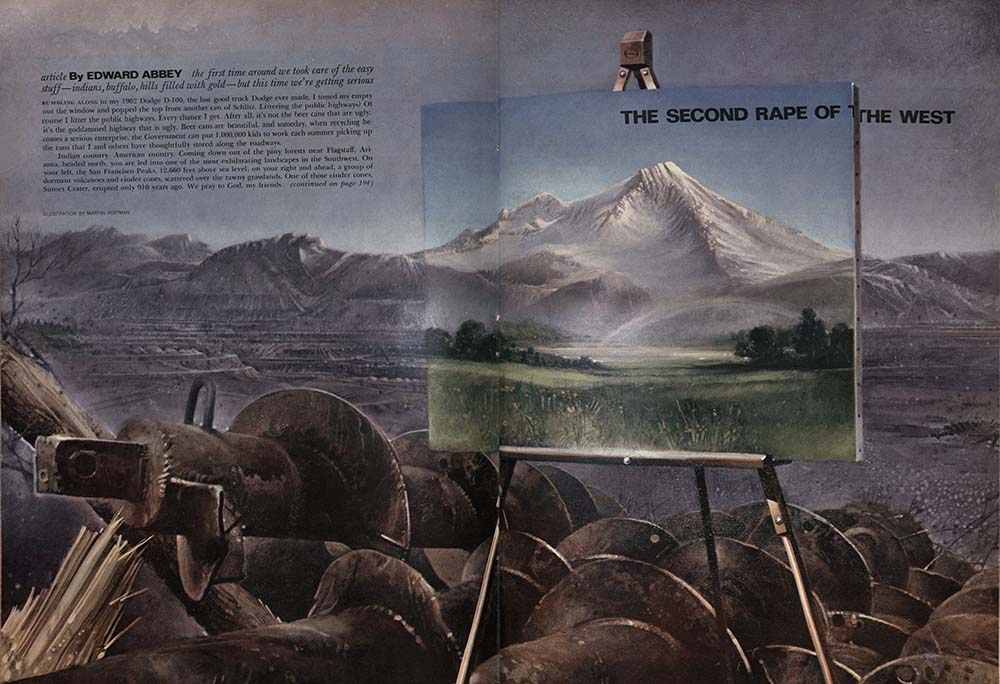
THE SECOND RAPE OF THE WEST
Edward Abbey (1927-1989)
Chicago, IL: Playboy, c1975
GE155 W47 A23 1975
Article from Playboy, vol. 22, no. 12, December 1975. Gift of Eric Hvolboll.
“Comes the now the familiar growing roar of uproarious waters. Not far ahead the river plays its usual conjuring trick, seeming to pour over the edge of the known world and disappear down into some kind of grumbling abyss…We’ve seen it before.”
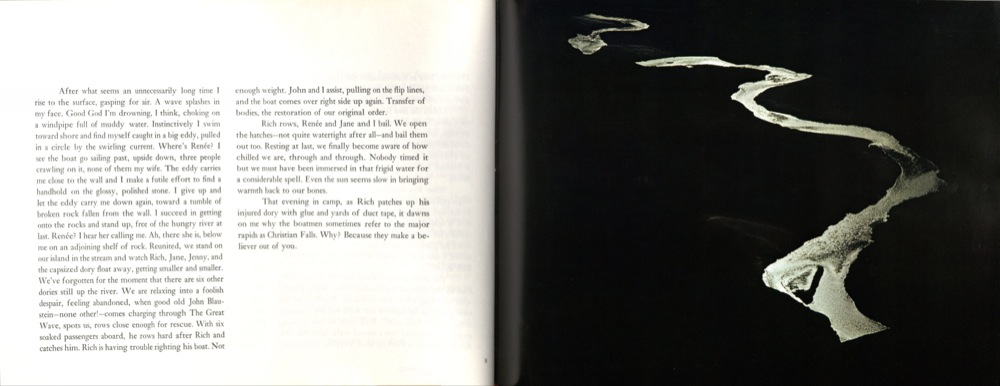
THE HIDDEN CANYON: A RIVER JOURNEY
John Blaustein (1947-)
New York: Viking Press, 1977
GV776 C63 B55 1977
Text by Edward Abbey. Signed by Edward Abbey. Gift of Eric Hvolboll.
“The sun goes down. A few stray clouds catch fire, burn gold, vermillion, and driftwood blue in the unfathomed sea of space…A hard clean edge divides the crescent dunes into black shadow on one side, a phosphorescent light on the other. And above the rim of the darkening west floats the evening star.”
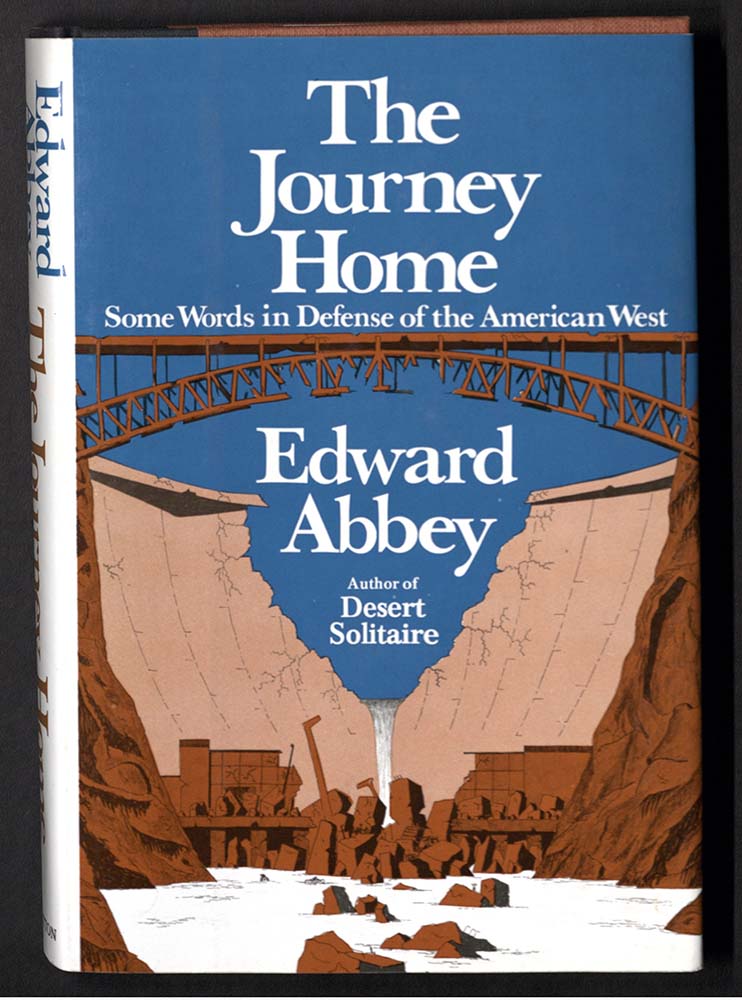
THE JOURNEY HOME: SOME WORDS IN DEFENSE OF THE AMERICAN WEST
Edward Abbey (1927-1989)
New York: Dutton, c1977
First edition
PS3551 B2 Z52 1977
Illustrations by Jim Stiles. Signed by Edward Abbey. Gift of Eric Hvolboll.
“The iron, wrinkled, savage mountains take on, briefly, a soft and beguiling radiance, as if illuminated from within. Canyons we have yet to look at, deep, narrow, blue-black with shadow, wind into the rocky depths.”
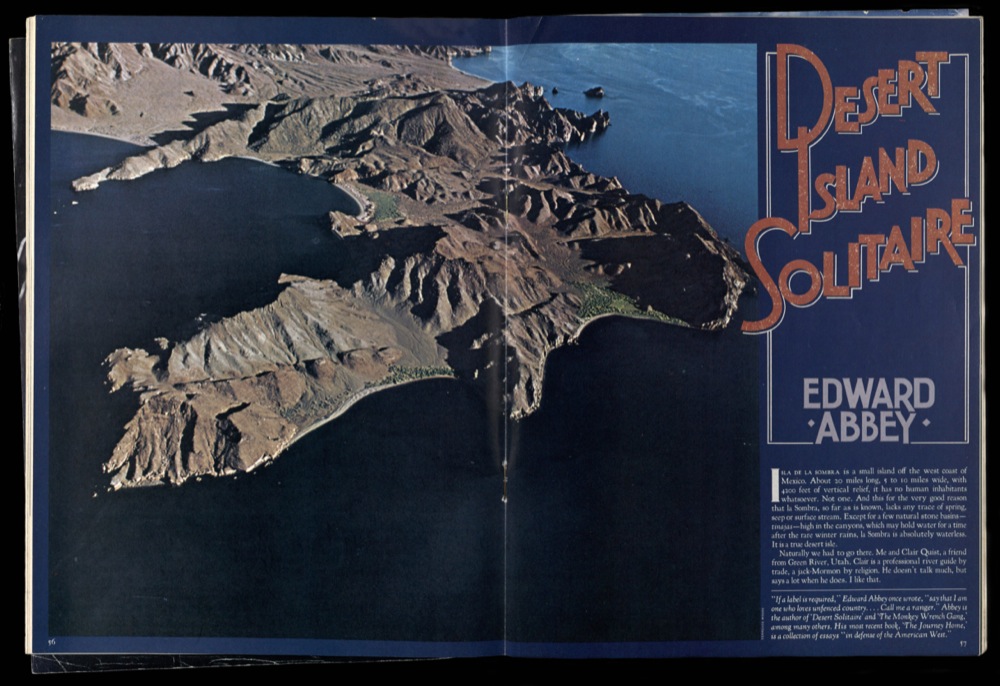
DESERT ISLAND SOLITAIRE
Edward Abbey (1927-1989)
San Francisco, CA: Rolling Stone, c1977
F1246 A23 1977
Article from Outside, vol. 1, no. 3, November 1977. Gift of Eric Hvolboll.
“One morning I was coming down off a boat onto the bomb-wrecked docks of Naples, Italy, when this man I’d never seen before tapped me on the shoulder and asked how tall I was. I told him I was six-foot-two on a warm day, but contracted a bit in cold weather. You’re a cop now, wiseass, said the man. He was a second lieutenant in the Military Police; I was an acne-haunted teen-age draftee in the infantry.”
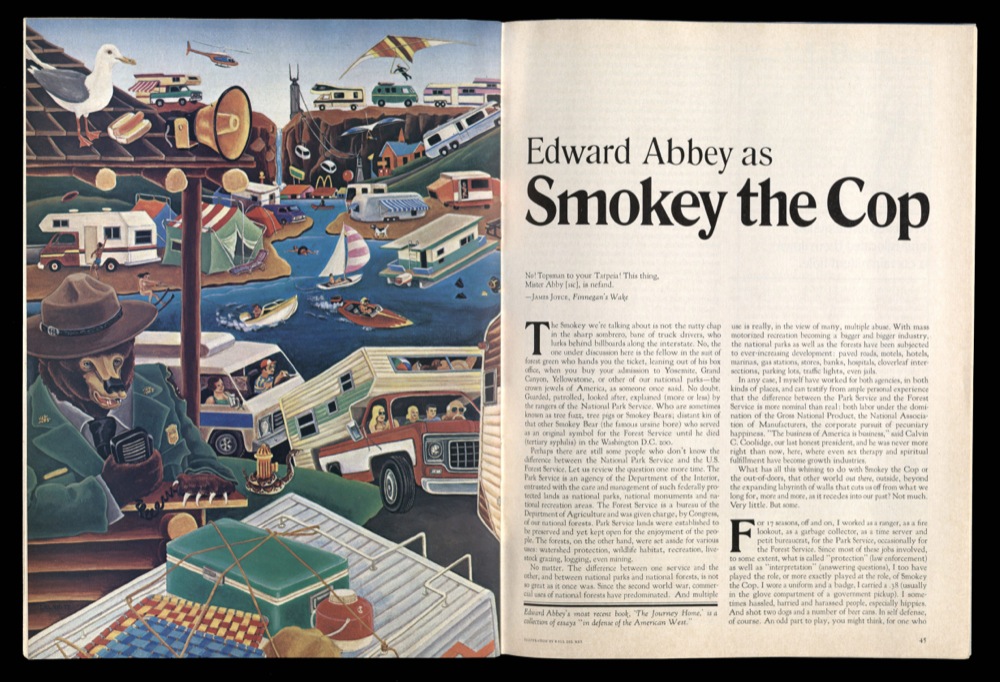
EDWARD ABBEY AS SMOKEY THE COP
Edward Abbey (1927-1989)
San Francisco, CA: Rolling Stone, c1978
PS3551 B2 Z468 1978
Article from Outside, vol, 1, no. 6, February 1978. Gift of Eric Hvolboll.
“Hayduke is probably the most celebrated of his characters, the arch-destroyer of The Monkey Wrench Gang, an ex-Marine who gleefully wrecks bulldozers, railways, bridges, helicopters, and other offenders against the landscape of the Southwest, and ends up as night watchman inside the dam that is the greatest offender of all, with mayhem on his mind.”
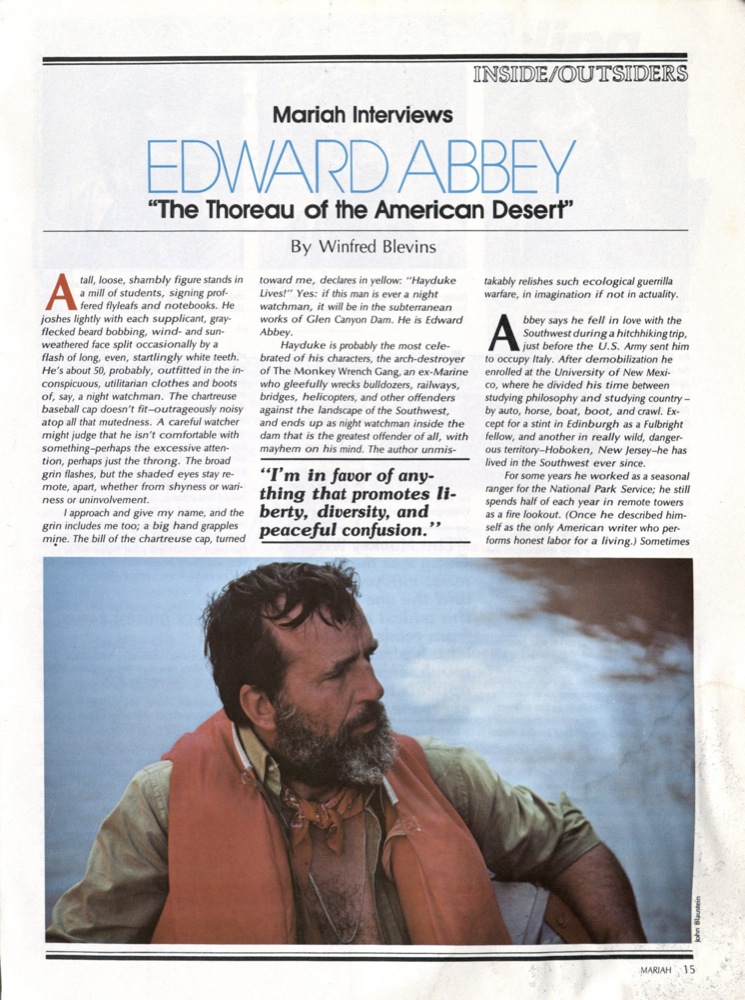
MARIAH INTERVIEWS EDWARD ABBEY, “THE THOREAU OF THE AMERICAN DESERT”
Winfred Blevins
Chicago, IL: Mariah Publications Corporation, c1978
PS3551 B2 Z592 1978
Article from Mariah, vol, 3, no. 5, October/November 1978. Gift of Eric Hvolboll.
“Abbey. Edward Abbey. Let’s see, now. That name has a familiar ring to it. Oh, yeah – Abbey’s that writer, the one who wrote a book about playing cards in the desert – Desert Solitaire – isn’t he? The guy who appeared on a national talk show and didn’t have anything to talk about and embarrassed everybody? And didn’t he, in The Monkey Wrench Gang, threaten to blow up Glen Canyon Dam and chop down highway billboards?”
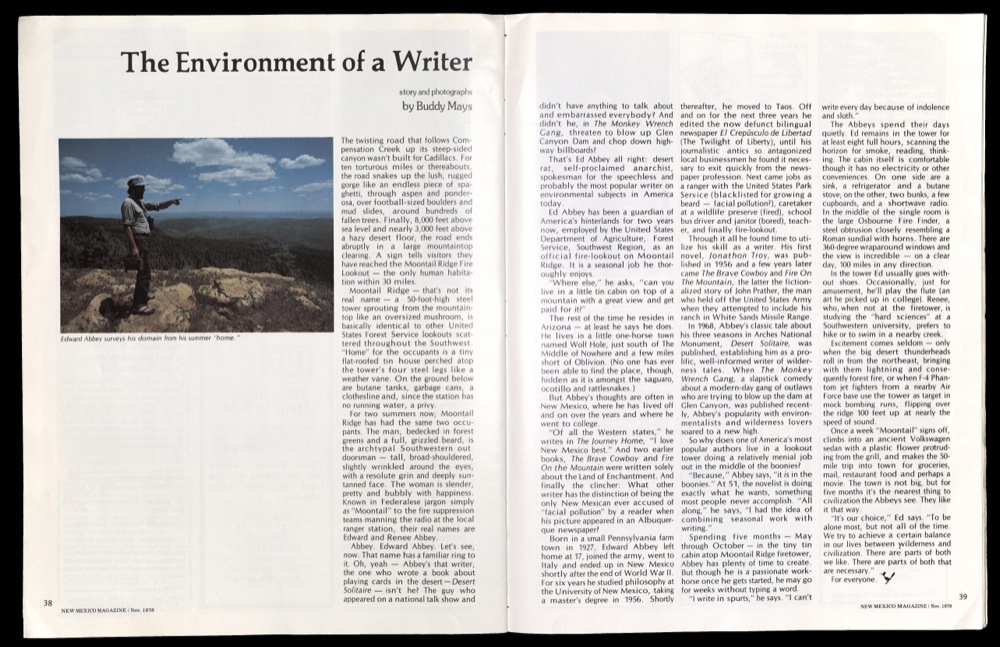
THE ENVIRONMENT OF A WRITER
Buddy Mays
Santa Fe, NM: New Mexico Magazine, c1978
PS3551 B2 Z785 1978
Article from New Mexico Magazine, vol. 56, no. 11, November 1978. Gift of Eric Hvolboll.
“Though it’s rude to stare, I cannot help but look again at his weathered face, the map of his soul. The expression there is attractive and appealing – serene, far-seeing eyes; a calm and easeful smile. Where have I seen that kind of face before?”
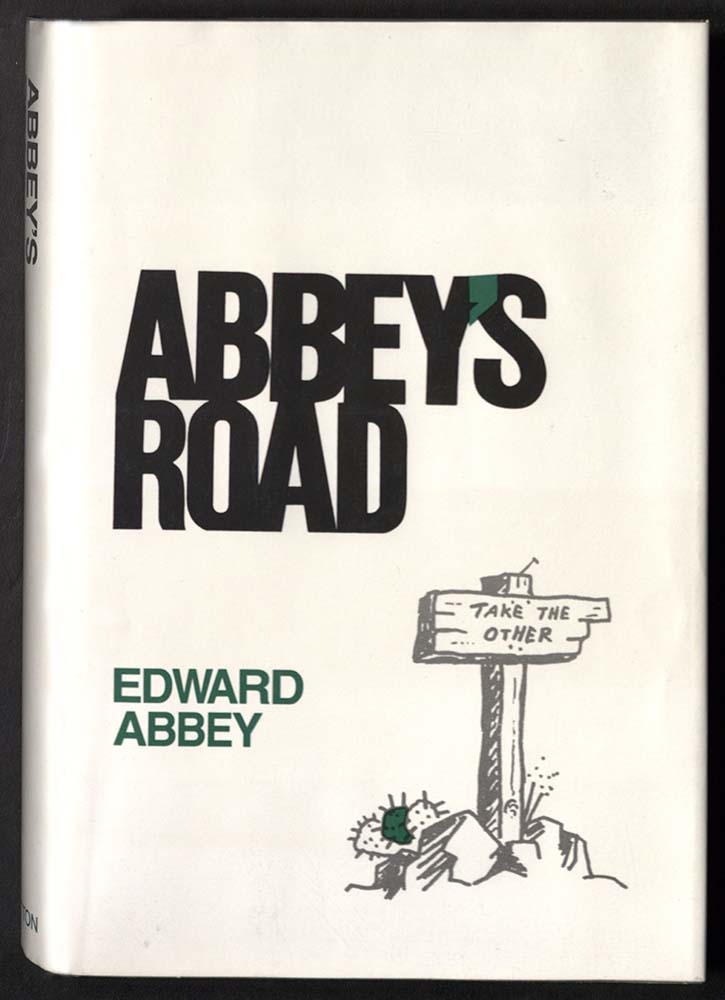
ABBEY’S ROAD
Edward Abbey (1927-1989)
New York: Dutton, c1979
PS3551 B2 Z4615 1979
Signed by Edward Abbey. Gift of Eric Hvolboll.
“There is something for everyone in Abbey’s Road. Rugged individualists will admire his praise of solitude and disdain for government. Eco-freaks will dote on his diatribes against mad scientists and a plan to slam a super-highway through Canyonlands National Park. Gun nuts and NRA card carriers will sleep easy knowing that ‘an armed citizenry is the first defense, the best defense, and the final defense against tyranny.’”
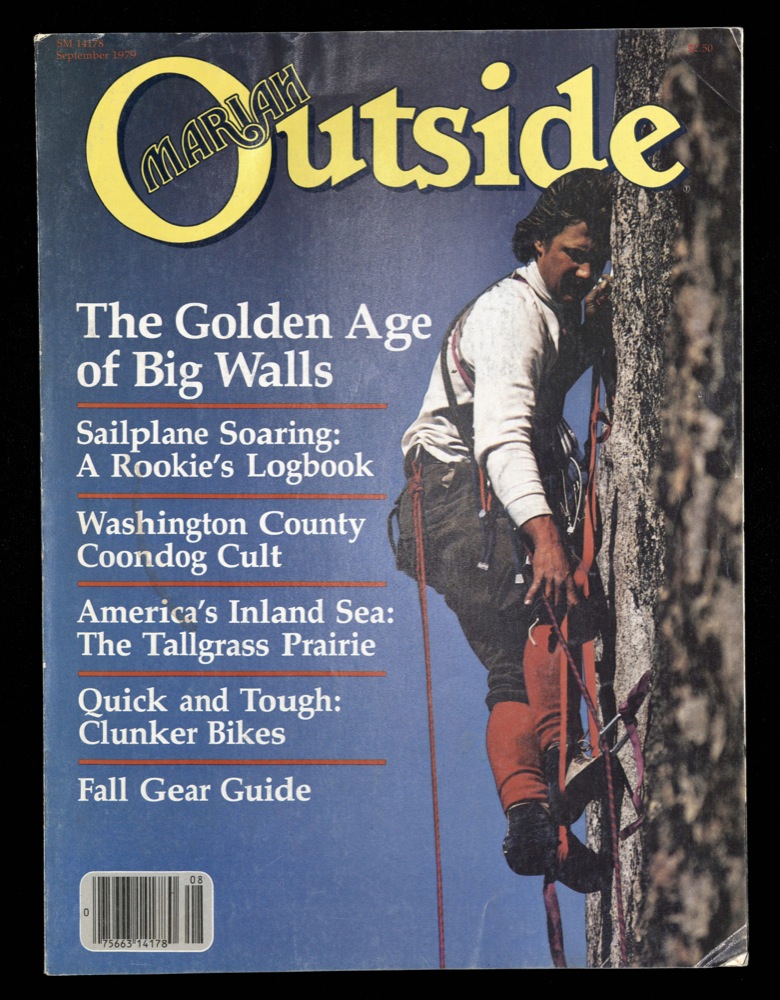
ABBEY’S ROAD
Anthony Campbell
Chicago, IL: Mariah Publications Corp., c1979
PS3551 B2 Z46153 1979
Review of Abbey’s Road from Mariah Outside, vol. 4, no. 4, September 1979. Gift of Eric Hvolboll.
“Anything that lives where it would seem that nothing could live, enduring extremes of heat and cold, sunlight and storm, parching aridity and sudden cloudbursts, among burnt rock and shifting sands, any such creature – beast, bird or flower – testifies to the grandeur and heroism inherent in all forms of life. Including the human. Even in us”
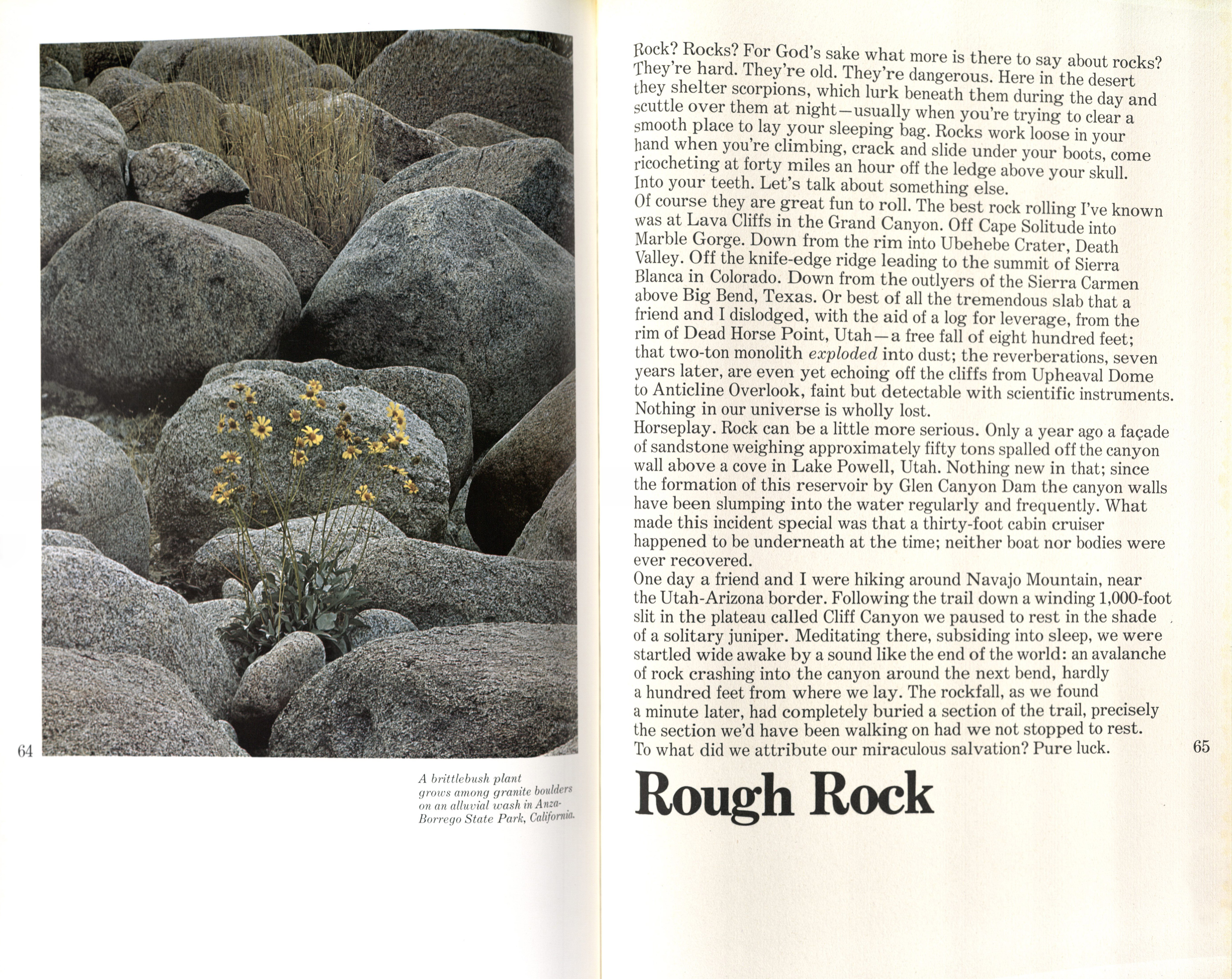
DESERT IMAGES: AN AMERICAN LANDSCAPE
David Muench
New York: Harcourt Brace Jovanovich, 1979
First edition
TR654 M83 1979
Photographs by David Muench. Text by Edward Abbey. Signed by David Muench. Gift of Eric Hvolboll.
“They are happy people, these crusaders, at ease with themselves and with others, radiant with the confidence of conviction, liberated by their own volition from the tedious, heavy, wearisome slavery of routine and passive acquiescence in which most of us endure our brief, half-lived half-lives.”
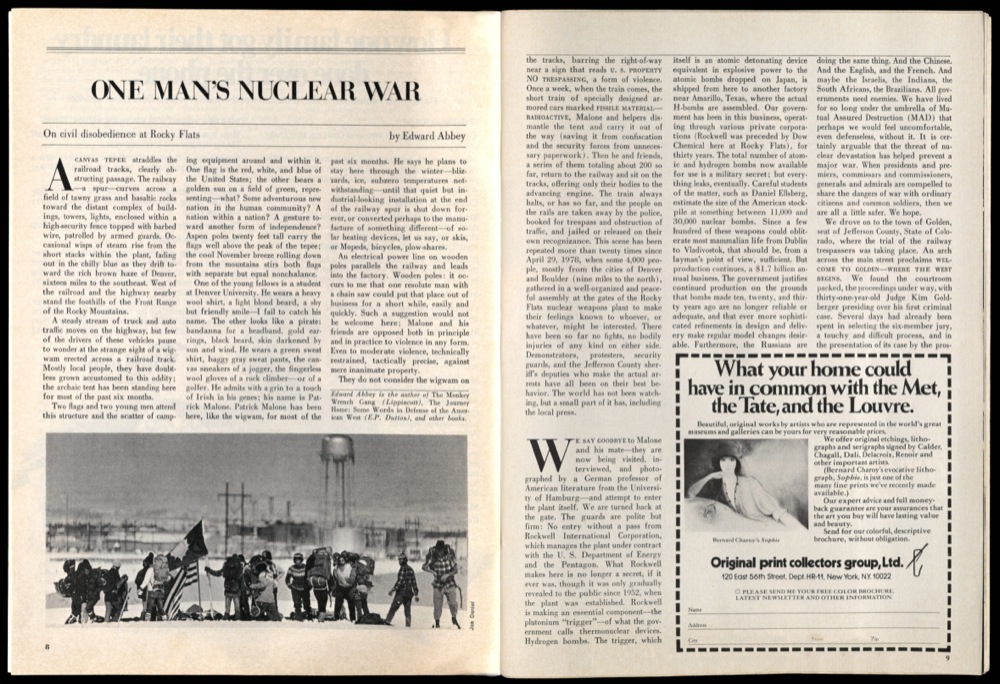
ONE MAN’S NUCLEAR WAR: ON CIVIL DISOBEDIENCE AT ROCKY FLATS
Edward Abbey (1927-1989)
New York, NY: Harper’s Magazine Company, c1979
JC328.3 A23 1979
Article from Harper’s, vol. 258, no. 1546, March 1979. Gift of Eric Hvolboll.
“Snow-dappled peaks rise in the distance, seven or eight thousand feet high. Most of them are unnamed, very few of them ever climbed. Hills in the middle distance are covered with what looks like green plush – alder jungles, almost impenetrable to a man. (But not to a bear.)”
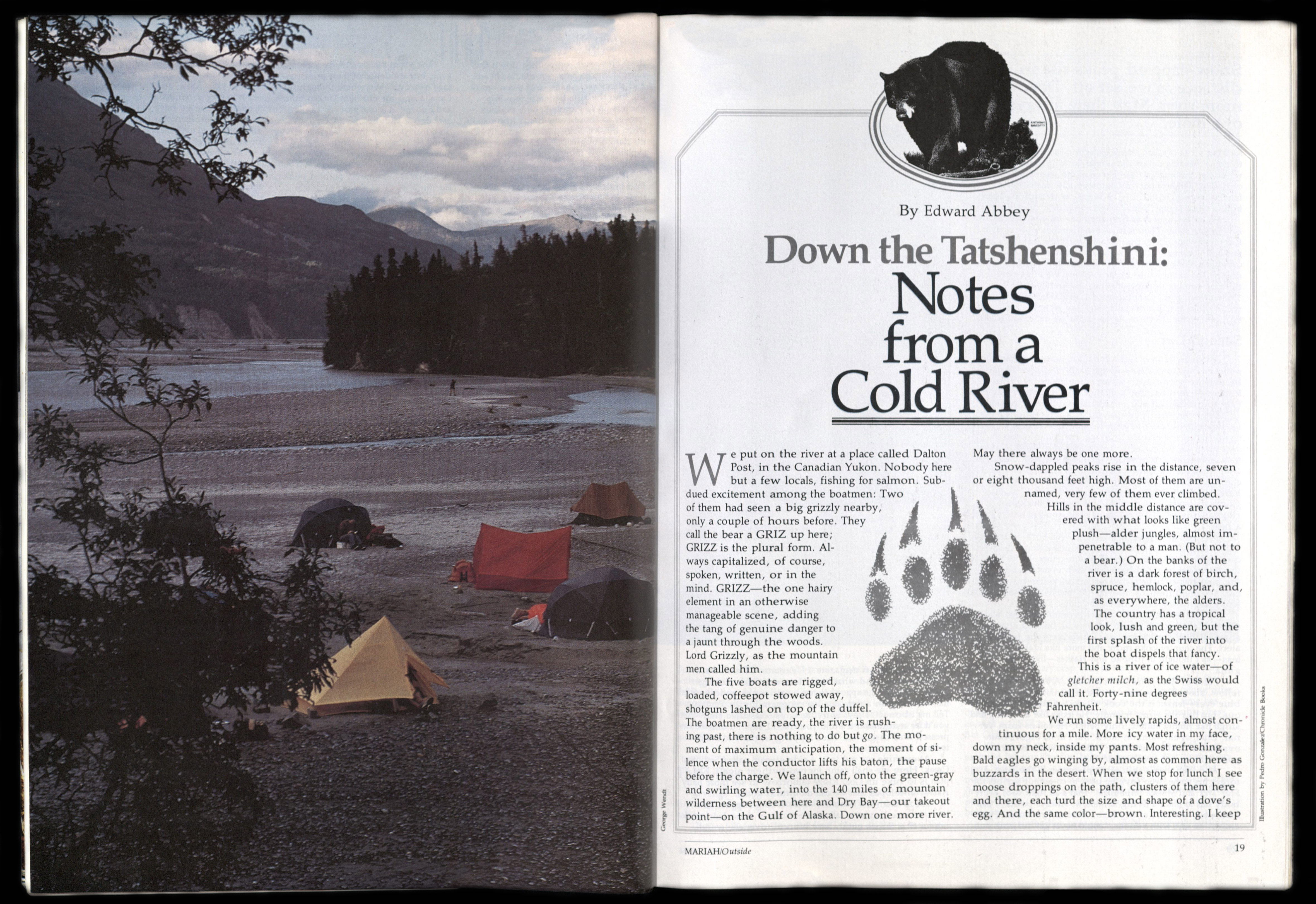
DOWN THE TATSHENSHINI: NOTES FROM A COLD RIVER
Edward Abbey (1927-1989)
Chicago, IL: Mariah Publications Corp., c1979
F912 T37 A23 1979
Article from Mariah Outside, vol. 4, no. 6, December 1979/January 1980. Gift of Eric Hvolboll.
“He reads the book of the world. The trail of a sidewinder on sand. The marks of an owl’s wings in the dust, coinciding with the terminus of a wood rat’s track…the age of a campfire…The flight of doves toward water…The ripeness of acacia beans, the flavor of jojoba nuts, the location of wild garlic bulbs…."
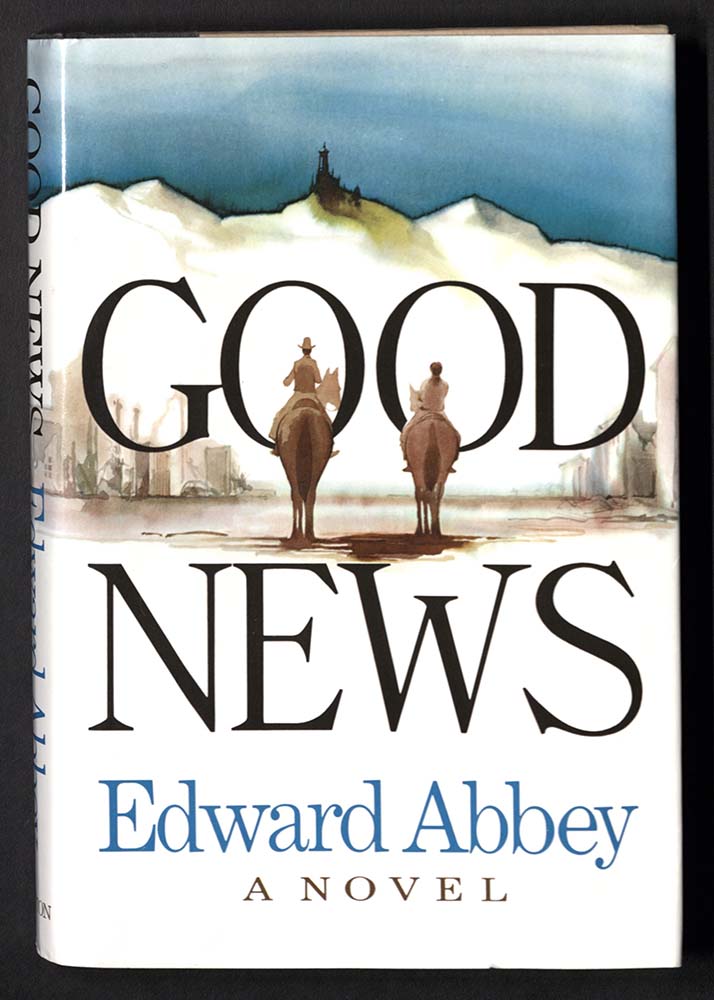
GOOD NEWS
Edward Abbey (1927-1989)
New York: Dutton, 1980
First edition
PS3551 B2 G6 1980
Signed by Edward Abbey. Gift of Eric Hvolboll.
“But none of this world’s great canyons, nor the one on Mars, much resembles the Grand Canyon. So far as I have been able to ascertain, no canyon even slightly resembles it. One may truly say that the Grand Canyon is unique. For once in his life Ronald Reagan, the friend of the redwoods, would have been right if he had said, “See one Grand Canyon and you’ve seen them all.”
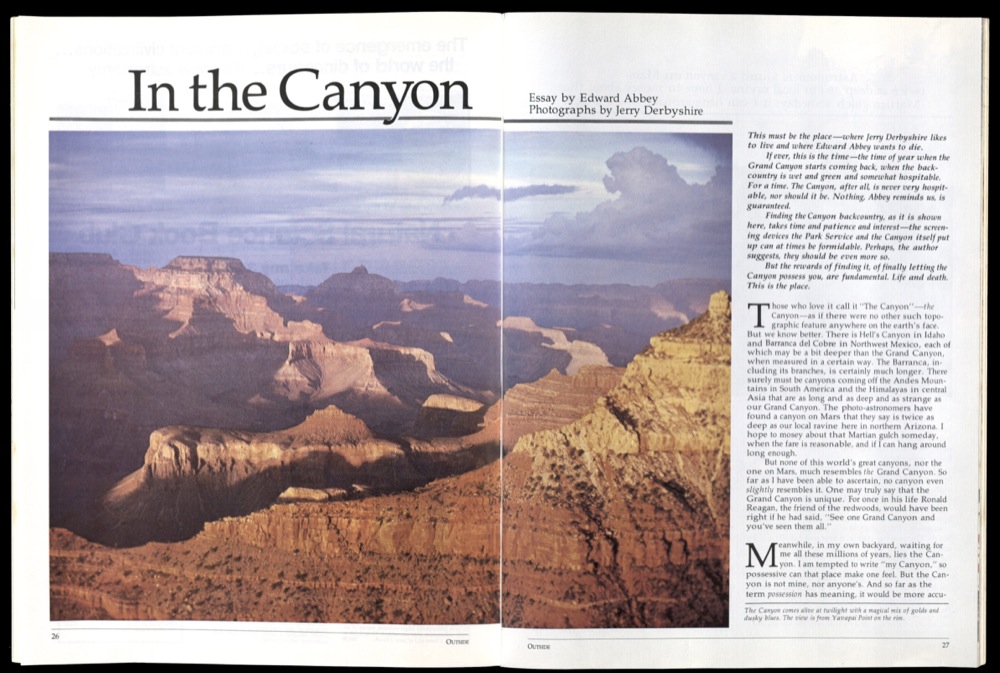
IN THE CANYON
Edward Abbey (1927-1989)
Chicago, IL: Mariah Publications Corp., c1980
F788 A23 1980
Article from Outside, vol. 5, no. 1, February/March 1980. Gift of Eric Hvolboll.
“Environmental journalism is not a cheerful field of work. The opposition is severe, well-funded, and becoming more brutal each year. After years of indifference, the managers of the corporate sector and their hired scribes…have finally awakened to the fact that environmentalism, if taken seriously, is a greater threat to the Perpetual Power & Growth Machine than labor unions or Communism.”
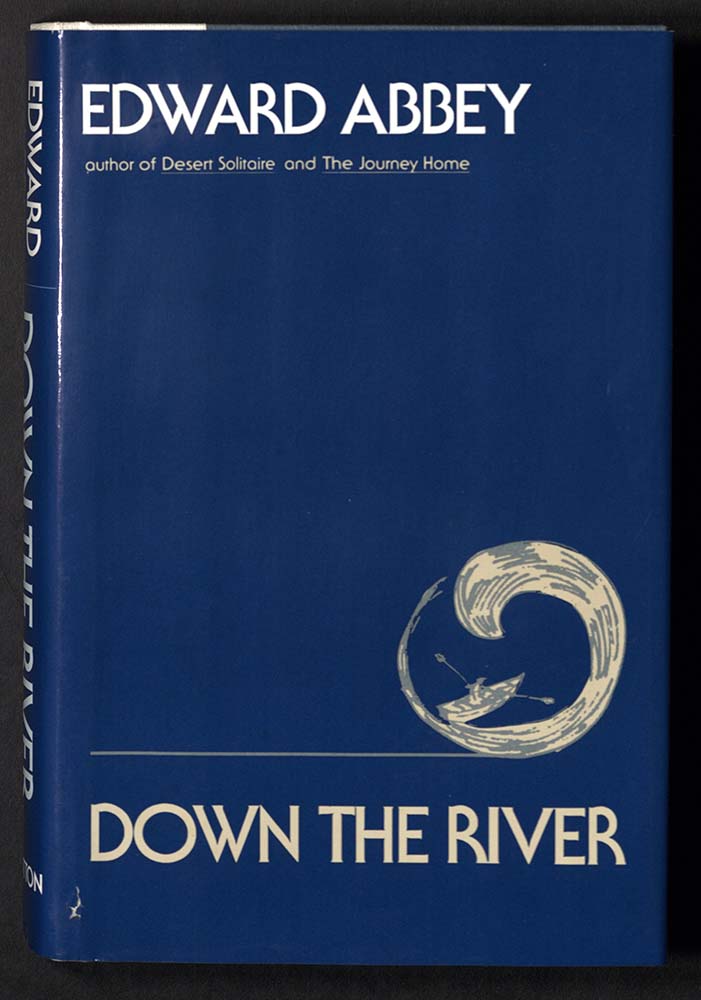
DOWN THE RIVER
Edward Abbey (1927-1989)
New York: Dutton, c1982
First edition
PS3551 B2 D68 1982
Illustrated by the author. Signed by Edward Abbey. Gift of Eric Hvolboll.
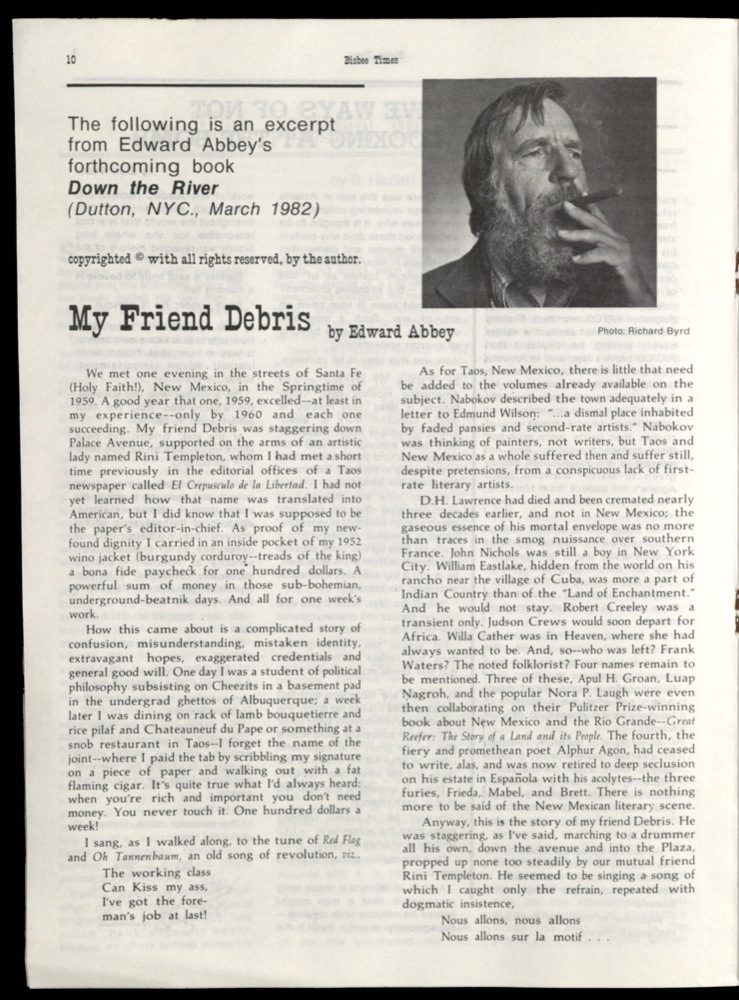
MY FRIEND DEBRIS
Edward Abbey (1927-1989)
Bisbee, AZ: Bisbee Times, c1982
PS3551 B2 D682 1982
An excerpt from Edward Abbey’s yet-to-be-published book, Down the River, printed in the Bisbee Times, February 1982 Gift of Eric Hvolboll.
“…the planets signify nothing but themselves…And that is all. And that is enough. And that is more than we can make head or tail of.”
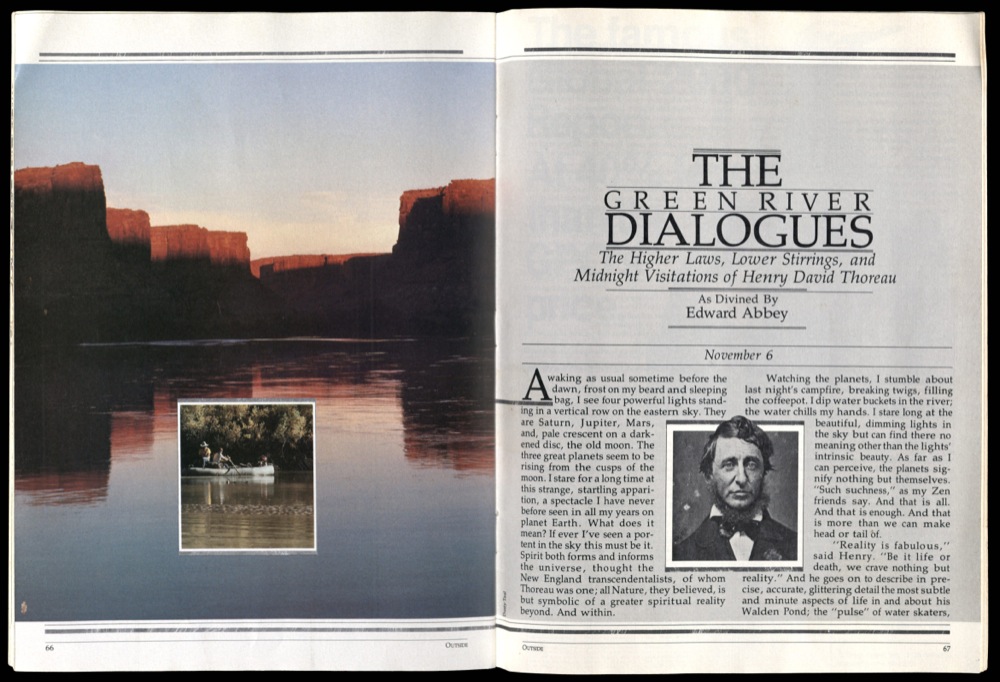
THE GREEN RIVER DIALOGUES: THE HIGHER LAWS, LOWER STIRRINGS, AND MIDNIGHT VISITATIONS...
Edward Abbey (1927-1989)
Chicago, IL: Mariah Publication Corp., c1982
PS3053 A55 1982
Article from Outside, vol. 7, no. 1, February/March 1982. Gift of Eric Hvolboll.
“…in many New West households George Hayduke has supplanted Jesse James as the desperado of choice. With Hayduke, Abbey has invented the plainsman for our times, the eco-raider – and, by some folks’ standards, a ‘moral equivalent’ to war.”
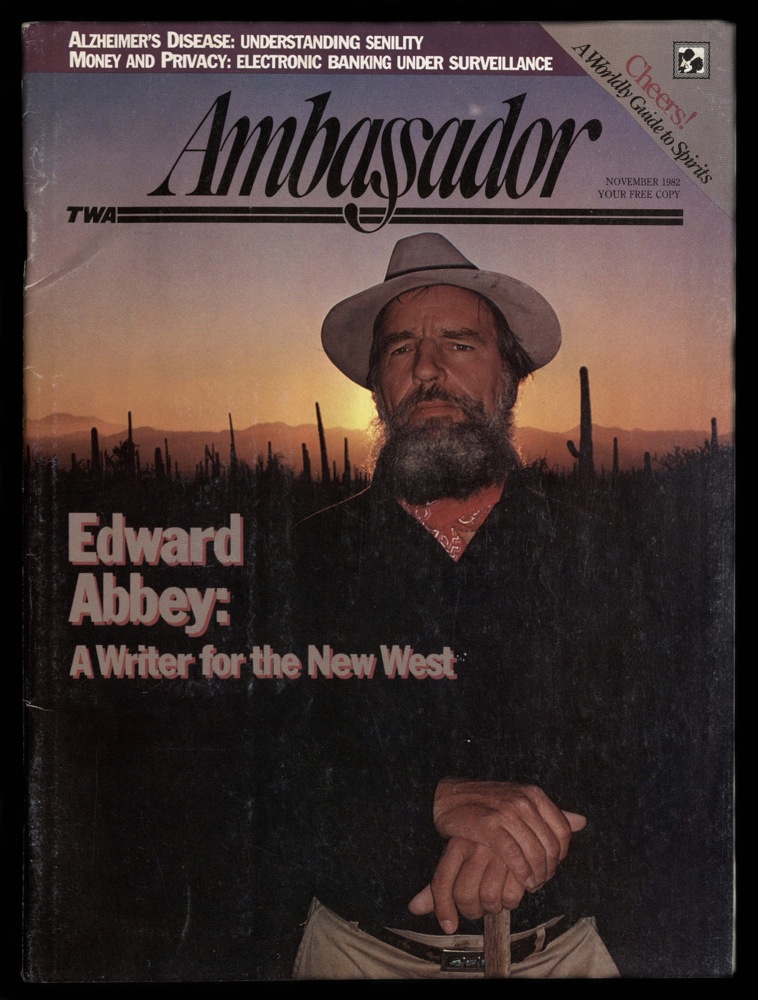
EDWARD ABBEY’S DESERT SOLECISMS
William Plummer (b. 1945)
St. Paul, MN: Paulsen Pub. Co., c1982
PS3551 B2 Z82 1982
Article from TWA Ambassador, vol. 15, no. 11, November 1982. Gift of Eric Hvolboll.
“The road climbs into open desert again, into sand and rock. The land of nada, kingdom of nihilo. God knows there’s plenty of both out here. But it’s a positive nothingness…rich in time, space, silence, light, darkness, the fullness of pure being.”
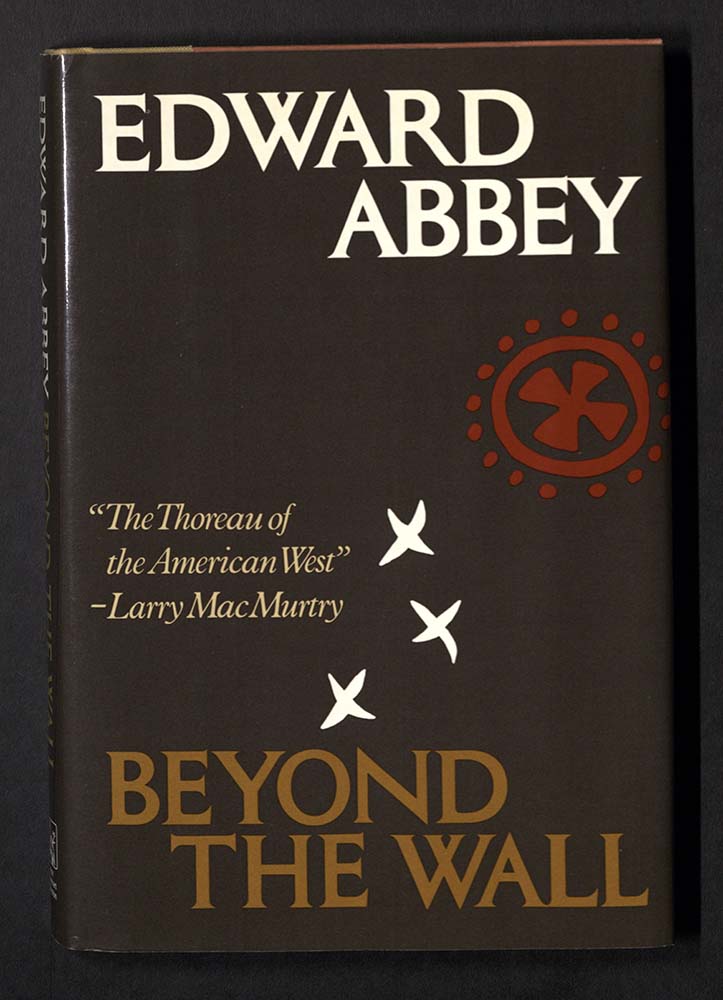
BEYOND THE WALL: ESSAYS FROM THE OUTSIDE
Edward Abbey (1927-1989)
New York: Holt, Rinehart and Winston, c1984
First edition
F595.2 A23 1984
Signed by Edward Abbey. Gift of Eric Hvolboll.
“About mountain lions – what’s this I hear that some mountain lions are killing some calves? I think I could get along fine without beef.”
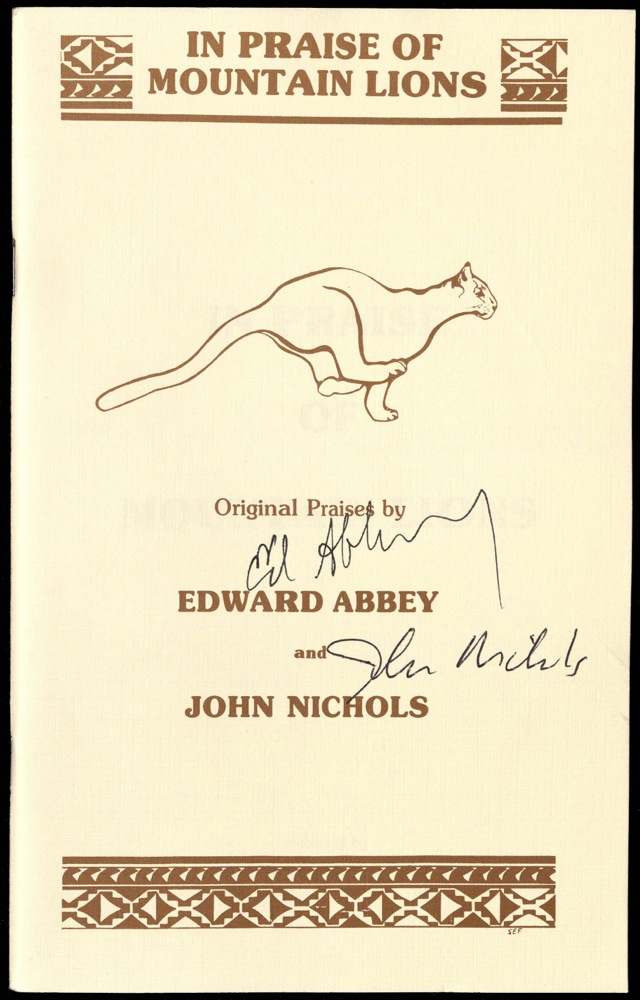
IN PRAISE OF MOUNTAIN LIONS
Edward Abbey (1927-1989) and John Treadwell Nichols (b. 1940)
Albuquerque, NM: Albuquerque Sierra Club, 1984
QL7378 C23 A16 1984
Signed by Edward Abbey and John Nichols. Gift of Eric Hvolboll.
“… I offer my experience to other writers, especially the new, the young, the struggling, as proof that the author need not subserve a mass market or pander to the East Coast literati…There is a middle way, a strait, tricky, but feasible channel between the rocks on the swift river of Mod Am Lit…. Ignore the critics… And waste no time applying for gifts and grants – when we want money from the rich we’ll take it by force. The honorable way.”
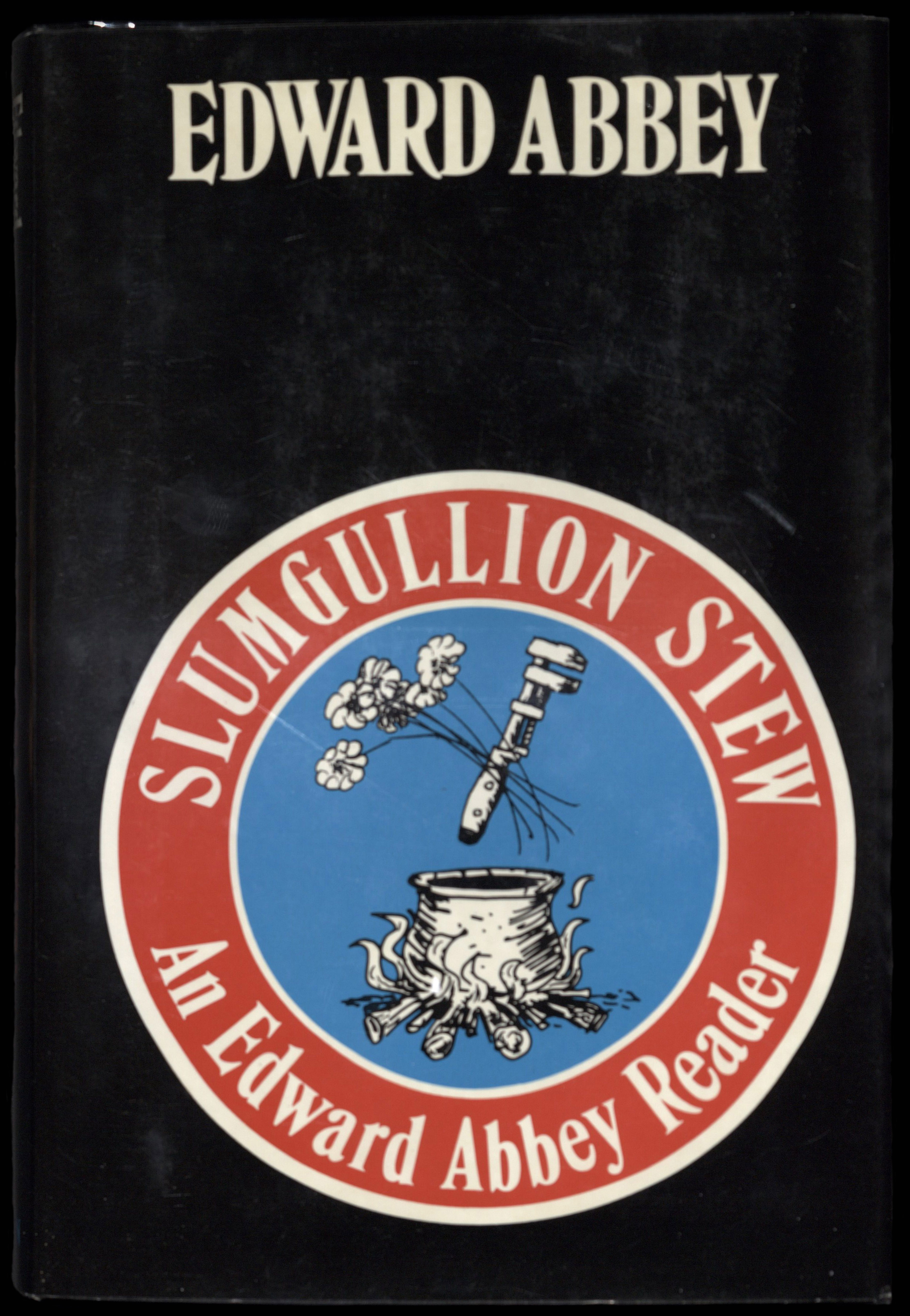
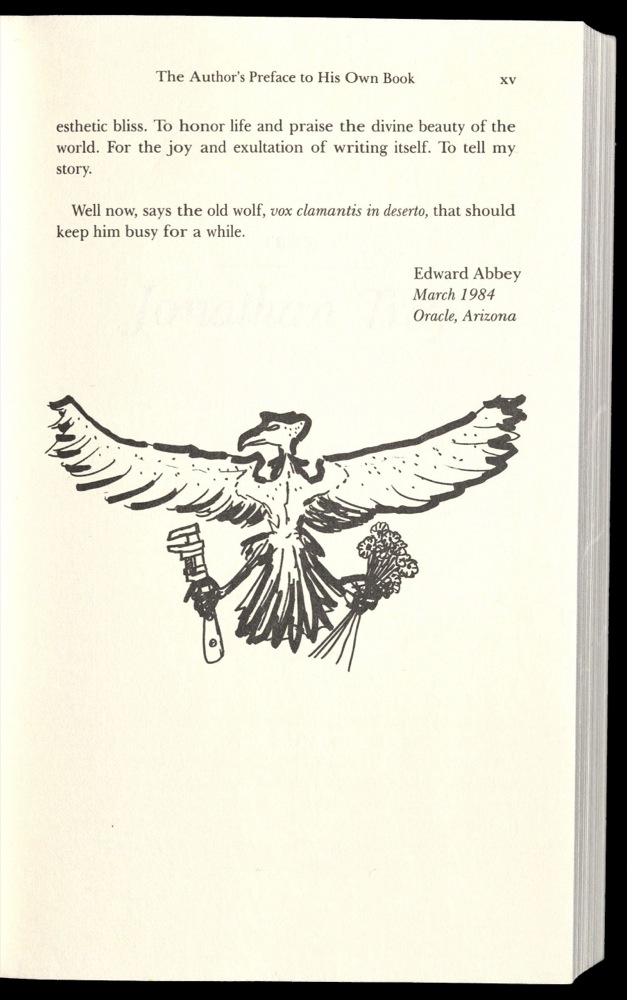
Edward Abbey (1927-1989)
New York: Dutton, c1984
First edition
PS3551 B2 A6 1984
Illustrated by the author. Selected chapters from Edward Abbey’s novels published between 1954 and 1982. Signed by Edward Abbey. Gift of Eric Hvolboll.
“This is going to be a long march…my moving shadow angles before me, stretching toward the late afternoon, toward evening. Obsessive repetition, the besetting vice of the thinking man. Every day lifting that awful sun into the sky, then the heavy moon…Every night lying down to die for a while.”
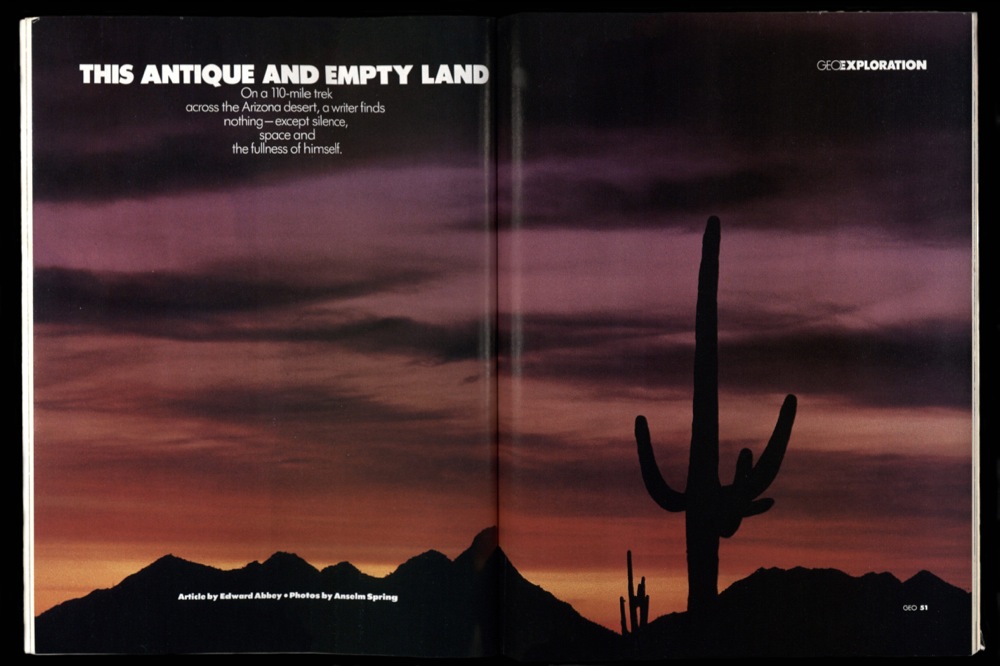
THIS ANTIQUE AND EMPTY LAND
Edward Abbey (1927-1989)
Los Angeles, CA: Knapp Communications Corporation, c1984
PS3551 B2 Z475 1984
Article from Geo, vol. 6, April 1984. Gift of Eric Hvolboll.
“Representative democracy in the United States has broken down. Our legislators do not represent those who elected them but rather the minority who finance their political campaigns and who control the organs of communication…that have made politics a game for the rich only. Representative government in the USA represents money not people and therefore has forfeited our allegiance and moral support.”
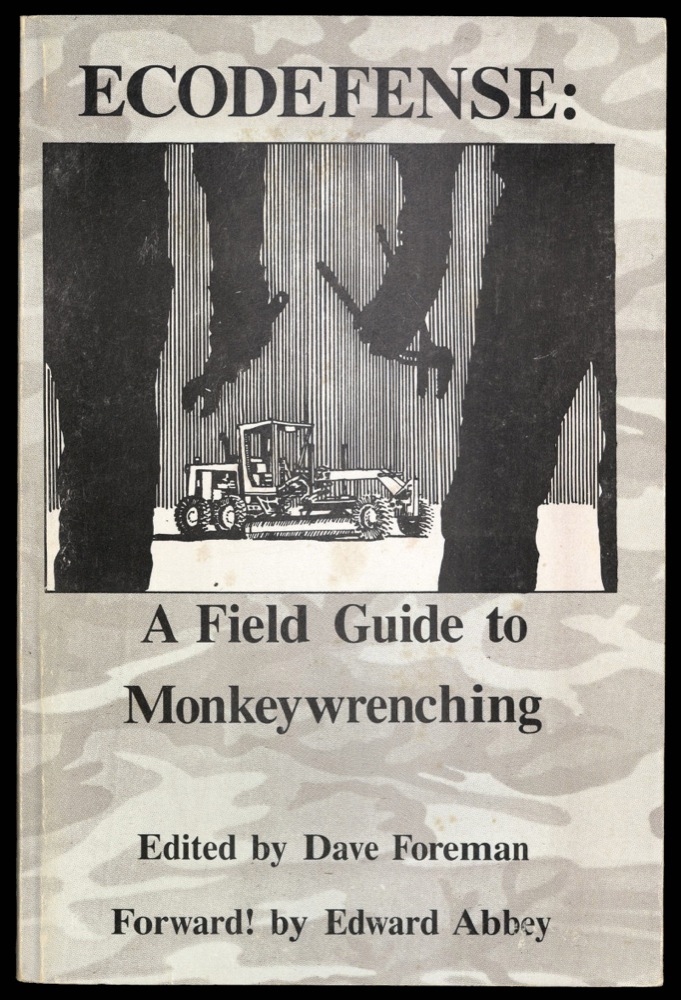
ECODEFENSE: A FIELD GUIDE TO MONKEYWRENCHING
Dave Foreman, ed.
Tucson, AZ: Earth First! Books, 1985
PS3551 B2 M662 1985
Forward! [sic] by Edward Abbey. Gift of Eric Hvolboll.
“We console ourselves, as we always do, with the thought that we’ll be back, sometime soon. We will return someday…Isn’t that what we always think, as we rush on toward the infinity of our unnamable desires? Isn’t that what we always say?”
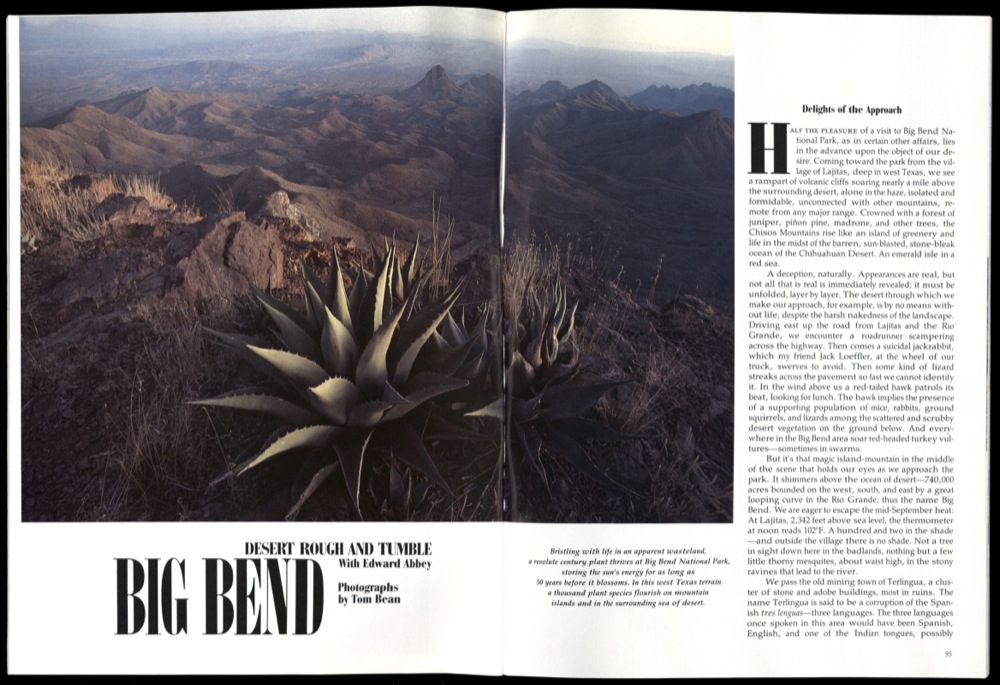
BIG BEND: DESERT ROUGH AND TUMBLE
Edward Abbey (1927-1989)
Washington, DC: National Geographic Society, c1985
F392 R5 A23 1985
Article from National Geographic Traveler, vol. 2, nol. 34, Autumn 1985. Gift of Eric Hvolboll.
“Such an art will always be more than personal, more than pretty, more than decorative. It will carry about it some part of the essence of an ancient way of life.”
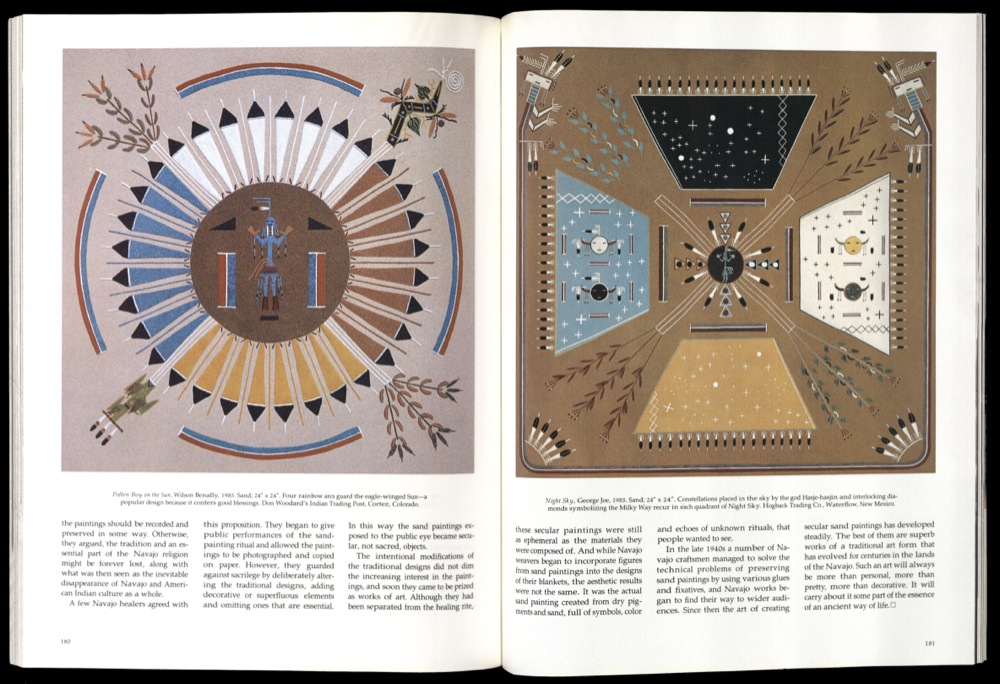
ART: CEREMONIES IN THE SAND: PAINTING THE MYTHS AND LEGENDS OF THE NAVAJO
Edward Abbey (1927-1989)
Los Angeles, CA: Architectural Digest Publishing Corp., c1986
E99 N3 A18 1986
Article from Architectural Digest, vol. 43, no. 3, March 1986. Gift of Eric Hvolboll.
“Relief followed by outrage. Those are the first two stages. The third stage is the worst and it will come soon enough, probably about three o’clock in the morning: The Fear. The Terror. The Panic – awakening in the dark to find myself, as I had dreamed and dreaded, alone.”
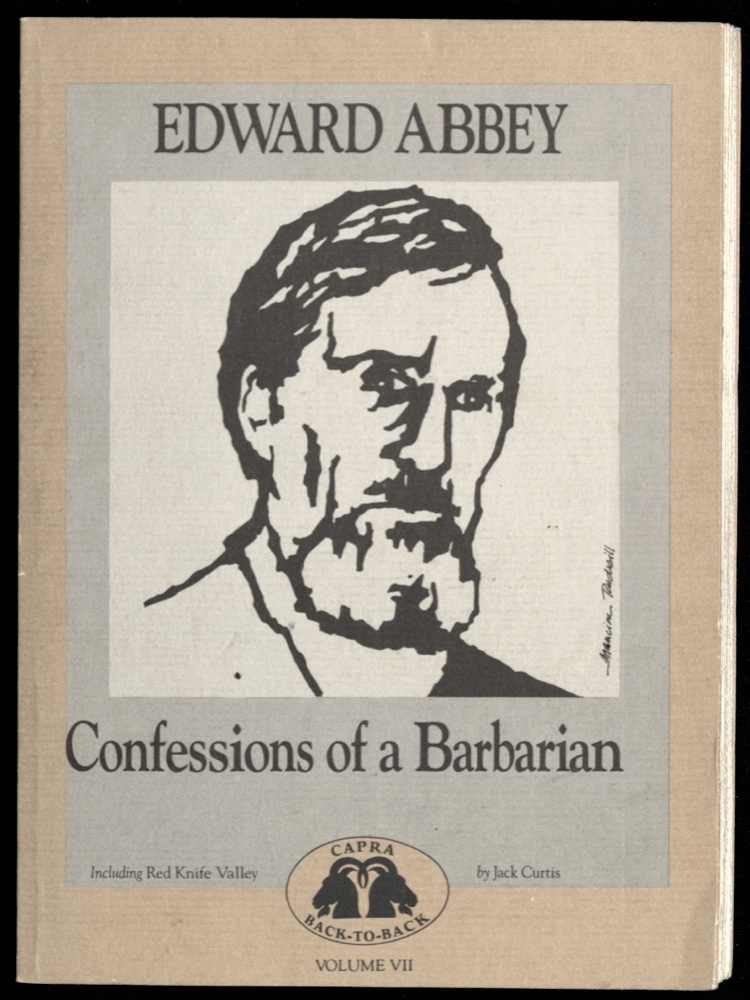
CONFESSIONS OF A BARBARIAN
Edward Abbey (1927-1989)
Santa Barbara, CA: Capra Press, 1986
PS3551 B2 C6 1986
This work became The Fool’s Progress. Gift of Eric Hvolboll.
“The big brute motor will grumble like a lion, old, tired, hesitating, then catch fire and roar, eight-hearted in its block of iron, driving onward, westward always, into the sun…”
“Nature will take care of things in her same old way, sooner or later. You know: famine, plague, war. The usual. Nobody lives forever. Neither do civilizations. They come and they go, like you and me.”
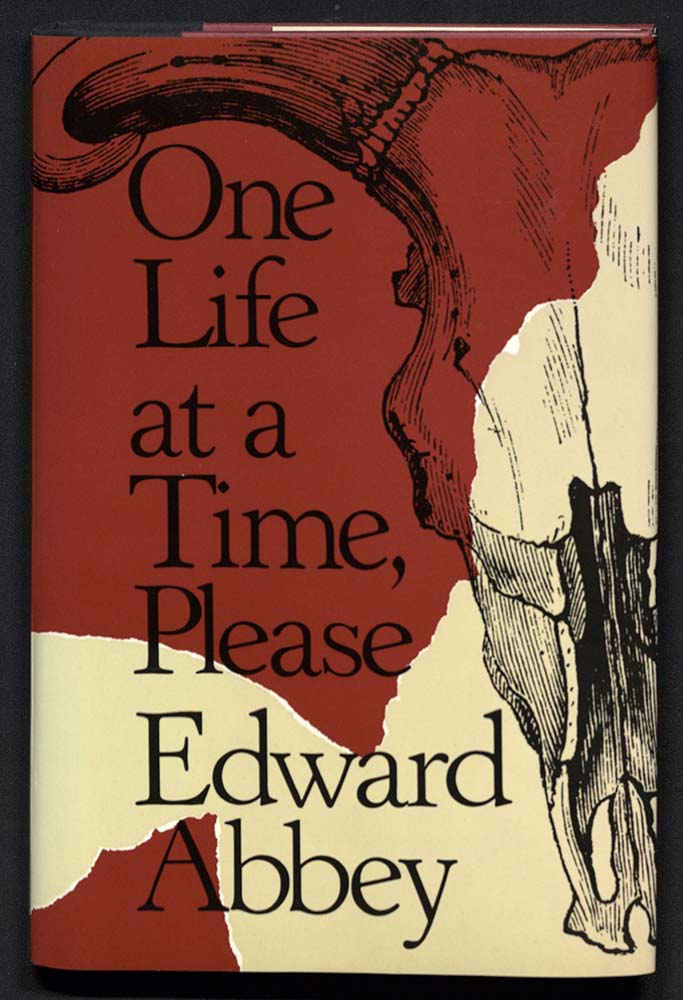
ONE LIFE AT A TIME, PLEASE
Edward Abbey (1927-1989)
New York: Holt, c1988
First edition
PS3551 B2 Z47 1988
Signed by Edward Abbey. Gift of Eric Hvolboll.
“Tell me, Mr. Abbey, how can one man, in a period of only 61 ½ years, become so thoroughly obnoxious?”
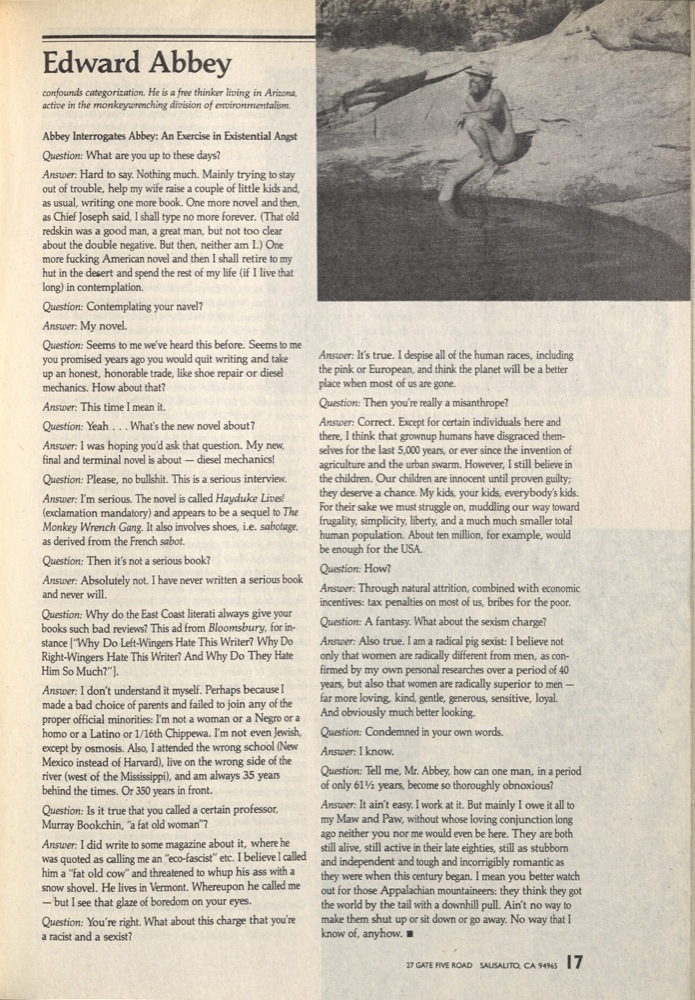
ABBEY INTERROGATES ABBEY: AN EXERCISE IN EXISTENTIAL ANGST
Edward Abbey (1927-1989)
Sausalito, CA: Point, c1988
PS3551 B2 Z4618 1988
Article from Whole Earth Review, 20th Anniversary issue, no. 61, Winter 1988.
“…the river tends to slow before each rapid, forming a pool above the partial dam of boulders that creates a rapid…The river pours in a glossy tongue between the largest rocks, suddenly accelerating, and; lunges into a frothy, boiling circus of colliding waterfalls, protruding teeth of stone, whirlpools, recoiling waves.”
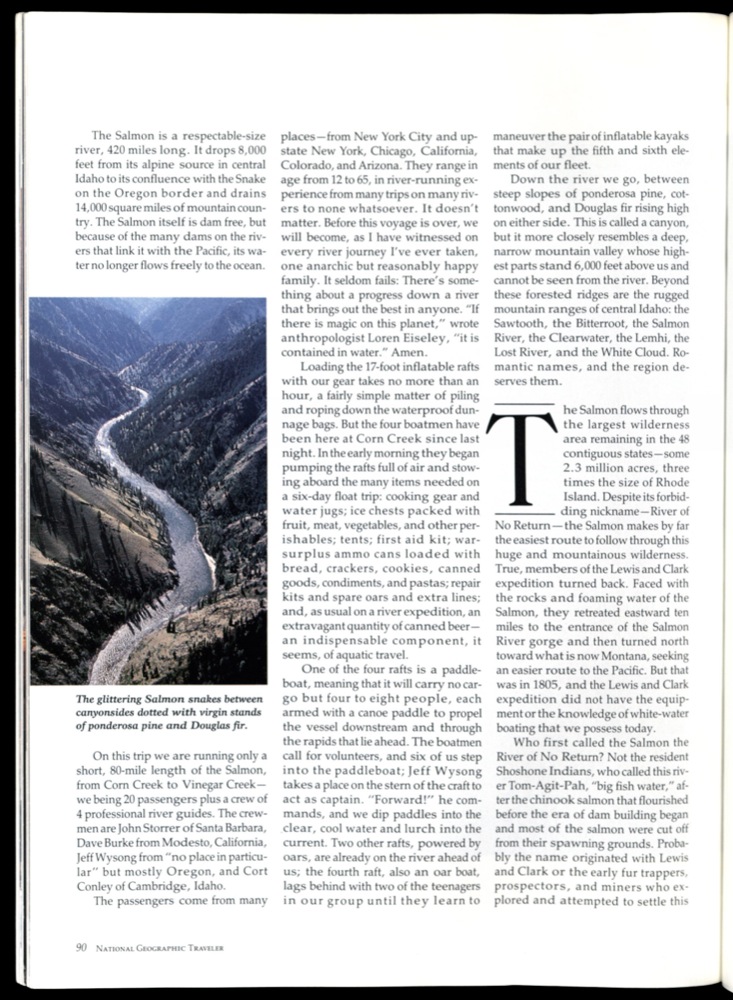
THE RIVER OF NO RETURN
Edward Abbey (1927-1989)
Washington, DC: National Geographic Society, c1989
F752 S35 A23 1989
Article from National Geographic Traveler, vol. 6, no. 4, July/August 1989. Gift of Eric Hvolboll.
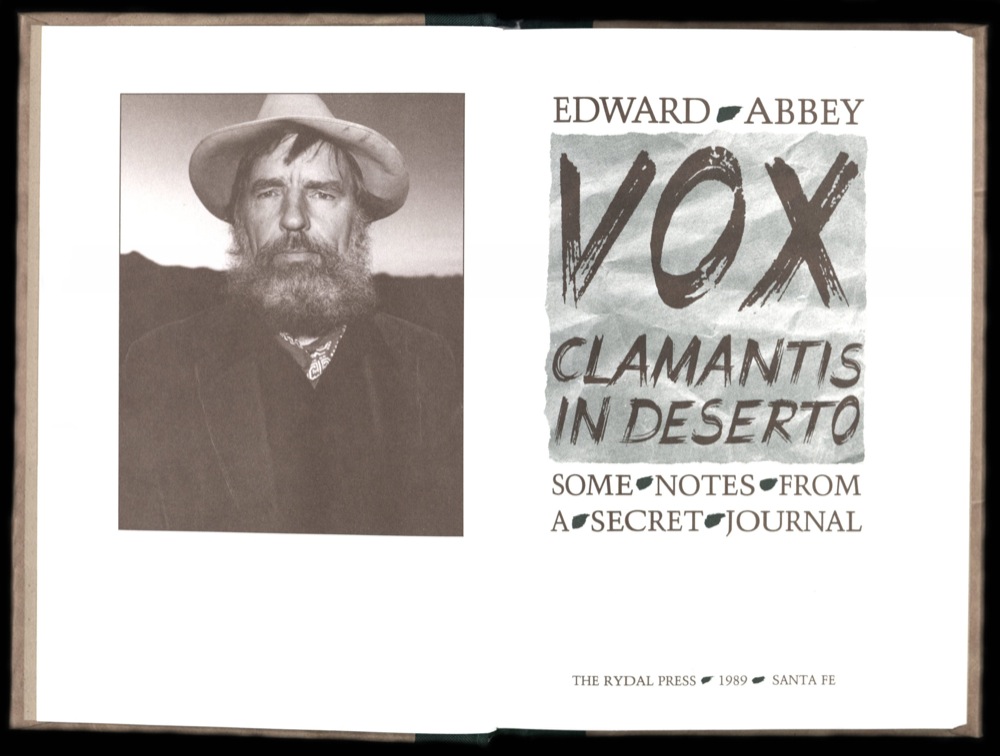
VOX CLAMANTIS IN DESERTO: SOME NOTES FROM A SECRET JOURNAL
Edward Abbey (1927-1989)
Santa Fe: Rydal Press, 1989
PS3551 B2 V6 1989
Edition of two hundred and fifty copies, 25 of which are lettered and reserved for the author, 225 of which are numbered and for sale. University of Utah copy is no. 44.
“The horseman on the canyon rim, missing little that’s alive and in motion, observes the rebirth of the desert turtle and doffs his big hat in salute. He replaces the hat and resumes his vigil, gazing toward the horizon for a sign of the enemy. Nothing this morning. After a while he blows his nose on the ground, wipes a finger on the horse’s haunch, turns the horse and rides away."
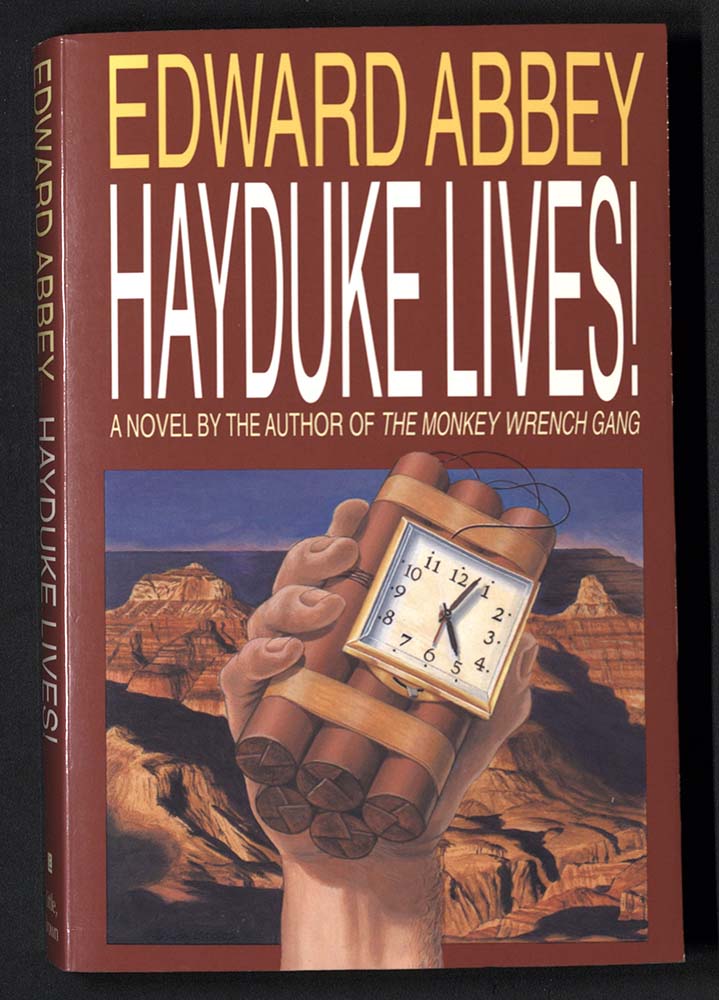
HAYDUKE LIVES!: A NOVEL
Edward Abbey (1927-1989)
Boston: Little, Brown, c1990
First edition
PS3551 B2 H39 1990
Gift of Eric Hvolboll.
